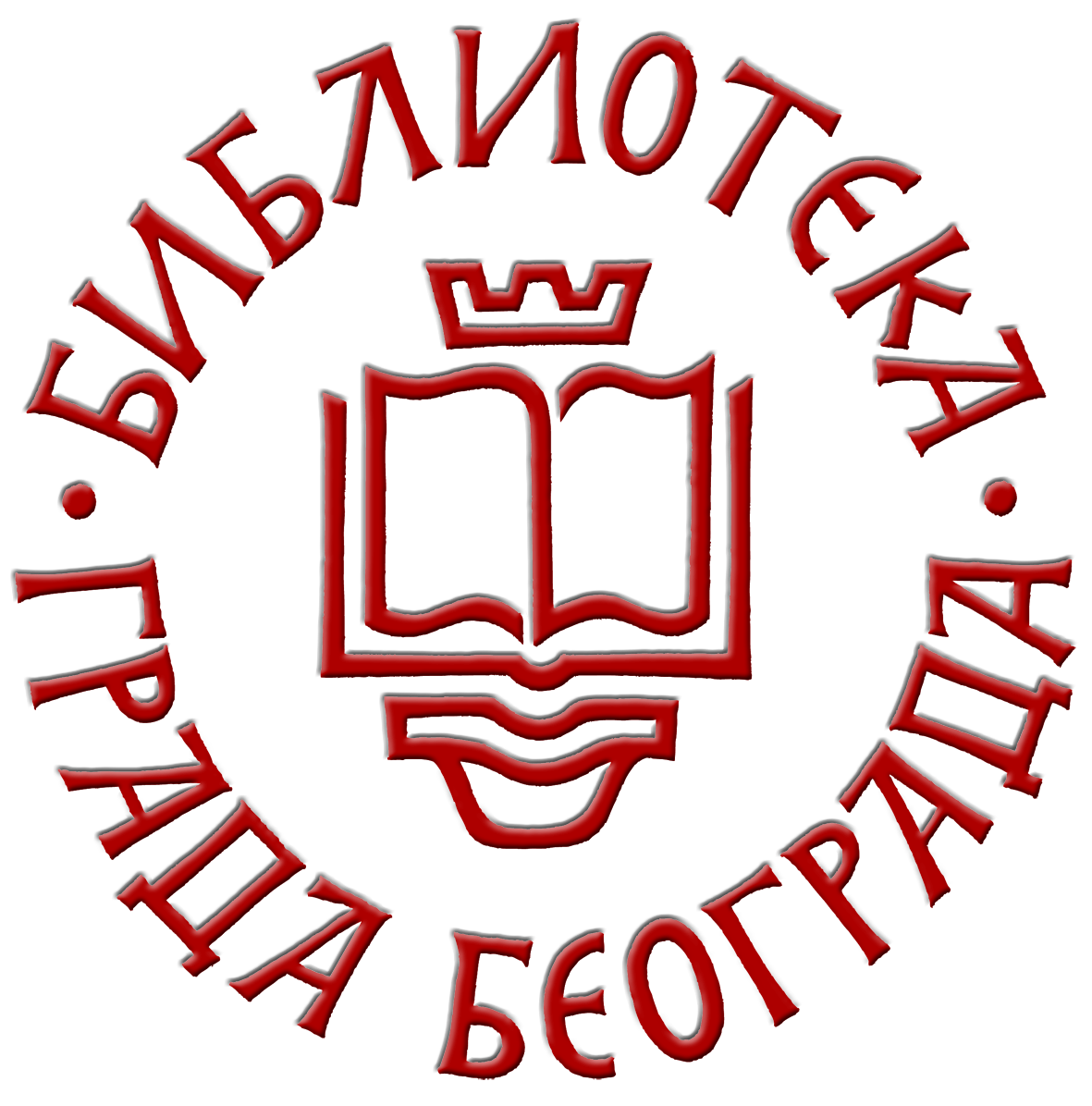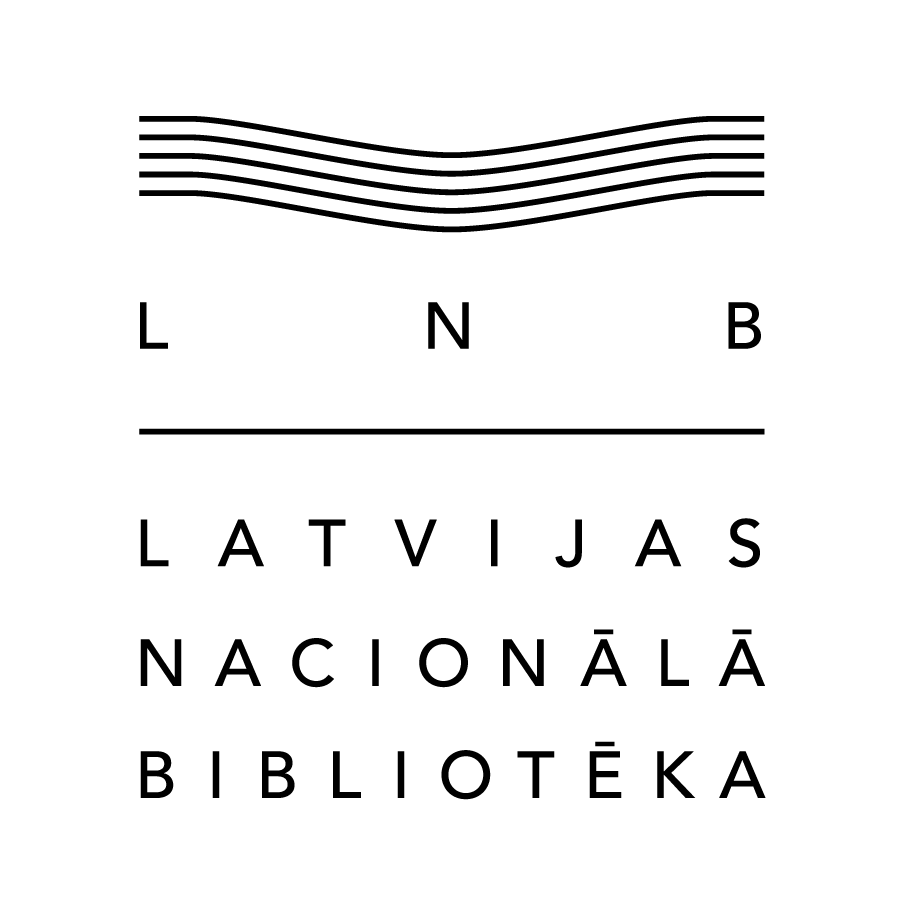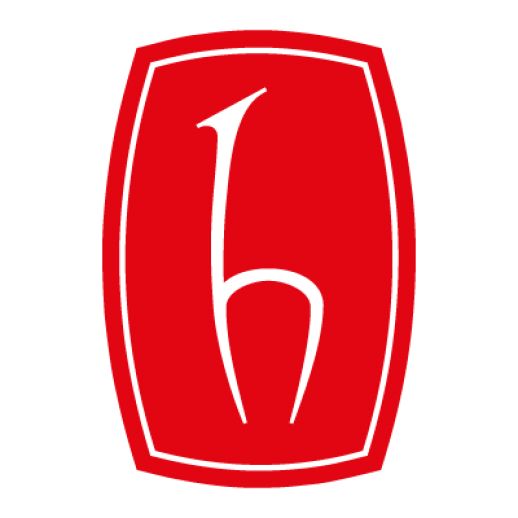CONFERENCE “NEWS LITERACY AND CRITICAL THINKING IN LIBRARIES” WAS HELD
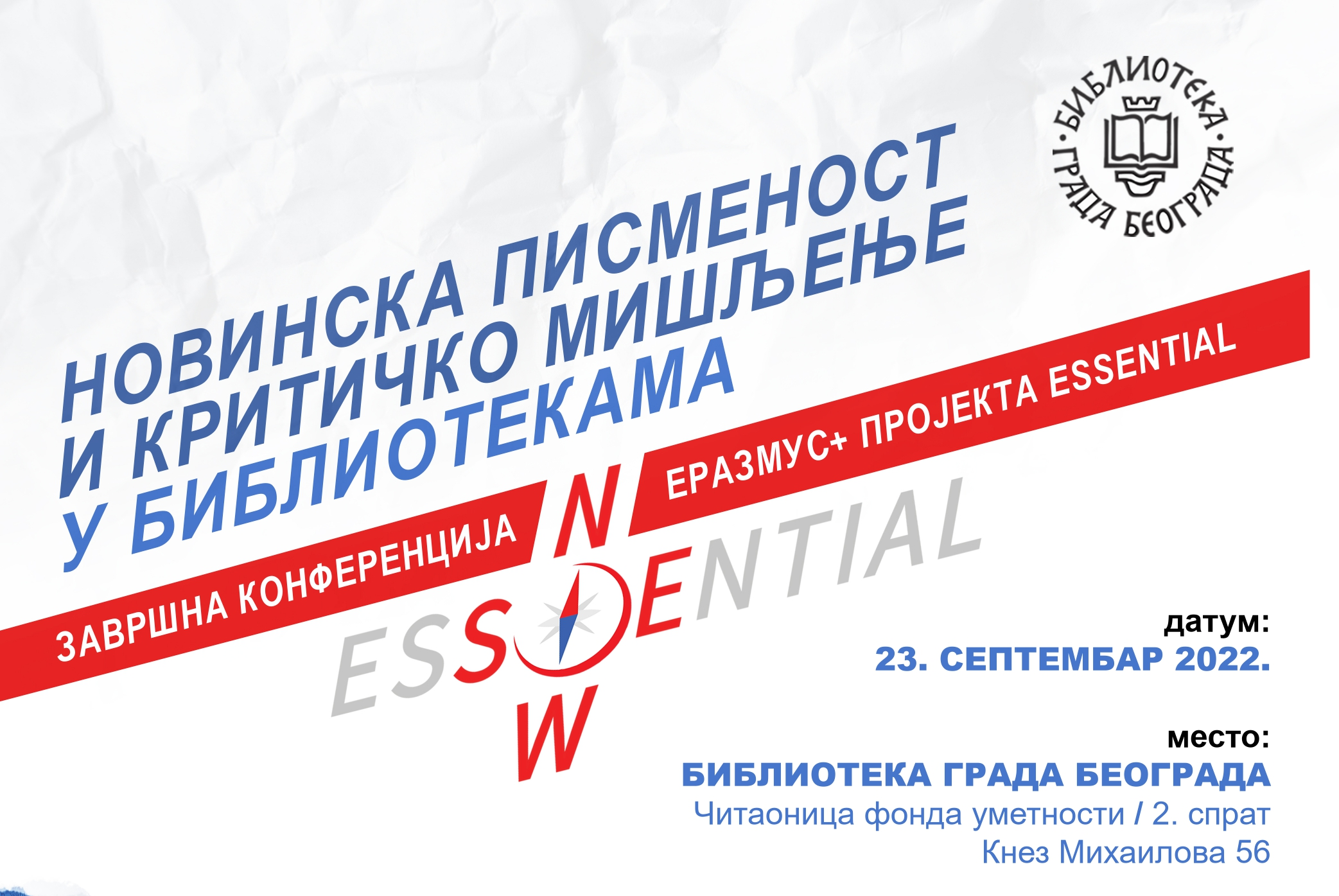
On Friday, September 23, 2022, the Belgrade City Library (BCL) hosted a conference entitled News Literacy and Critical Thinking in Libraries - the final conference of the ESSENTIAL project.
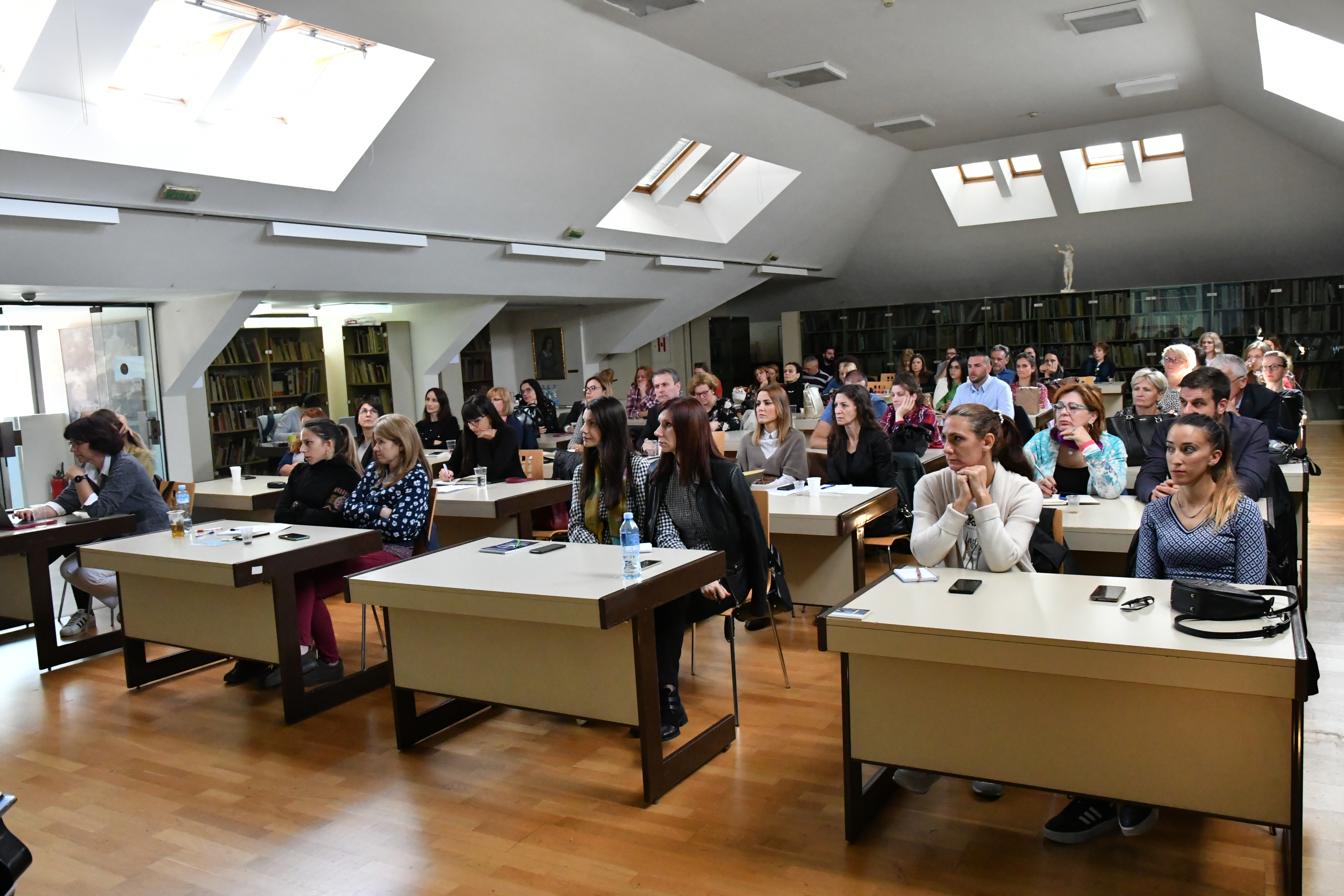
Belgrade City Library organised the conference as part of the international Erasmus+ project Enhancing Key Civic Competences for the Post-truth Era: News Literacy and Critical Thinking - ESSENTIAL.
Around sixty experts from libraries and other cultural institutions from all over Serbia (Belgrade, Novi Sad, Niš, Pirot, Šabac, Jagodina, Čačak, Užice, Pančevo, Valjevo, Ruma, etc.) and the region (Slovenia, Croatia, Bosnia and Herzegovina, Montenegro) attended the conference. The conference aimed to encourage and train interested parties, primarily librarians, to start educating citizens in this area in their institutions.
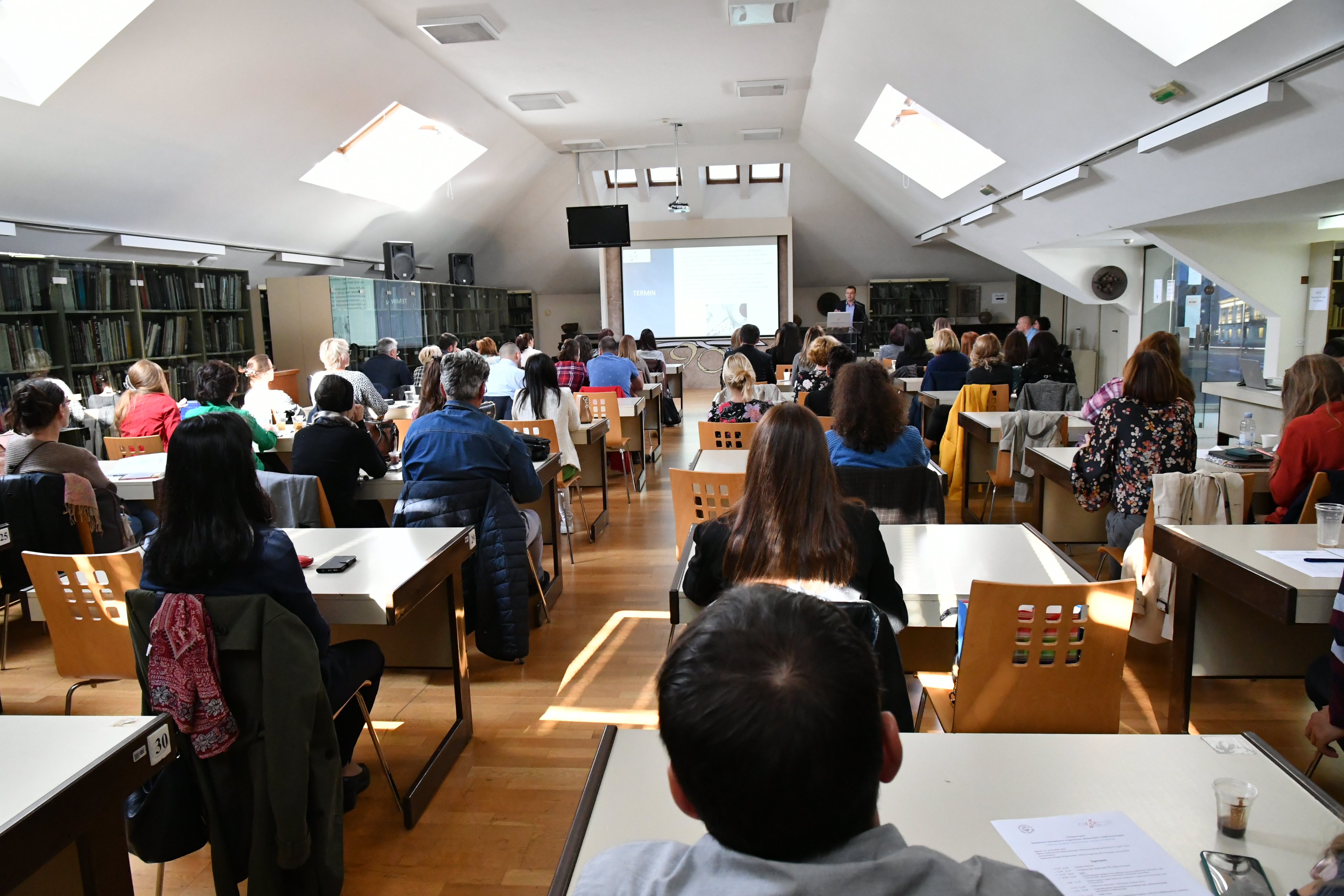
The conference presented the main results of the project, which also represent key educational resources for news literacy:
- Study Report: News Literacy and Critical Thinking Skills in the Post-Truth Era
- News Literacy Training Course
- News Literacy: Guidelines for Trainers
- Open online course in news literacy
- The project website, https://newslitproject.net, where all mentioned resources are available
Participants gained basic knowledge on news literacy: the concept of news literacy and its importance to an individual and society; how media and journalism influenced society in the post-truth era; how to recognise manipulative media techniques; how to identify fake news, photos, video content, and social media accounts; what are algorithms, news feeds, filtered bubbles, and echo chamber; what is the difference between bots, trolls, and cyborgs; how to find sources of reliable source information and how effectively to search the Web. They received detailed instructions and materials to help them become educators and successfully conduct news literacy workshops in their institutions.
The lecturers at the conference were employees of the BCL who completed the training for trainers in news literacy during the project.
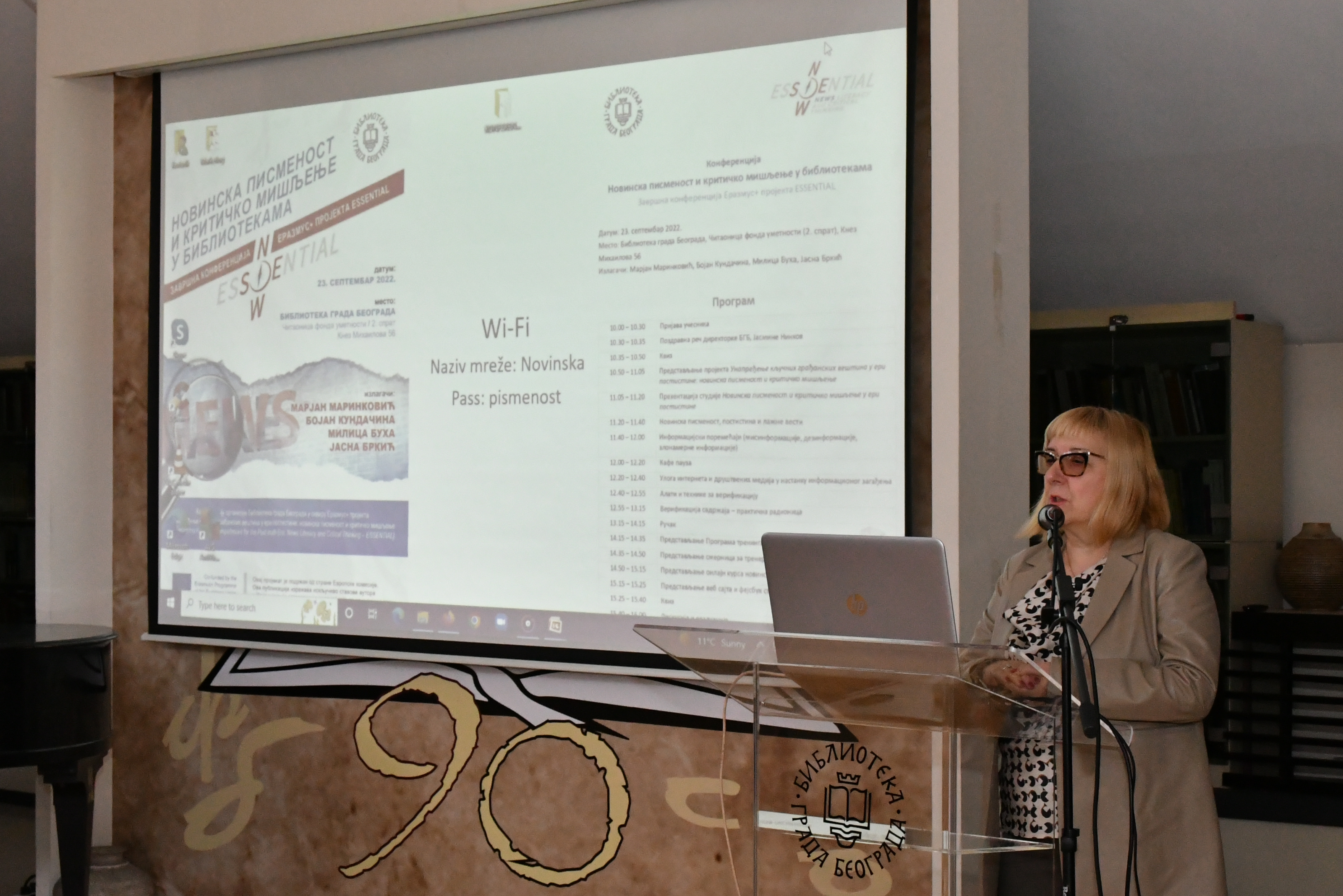
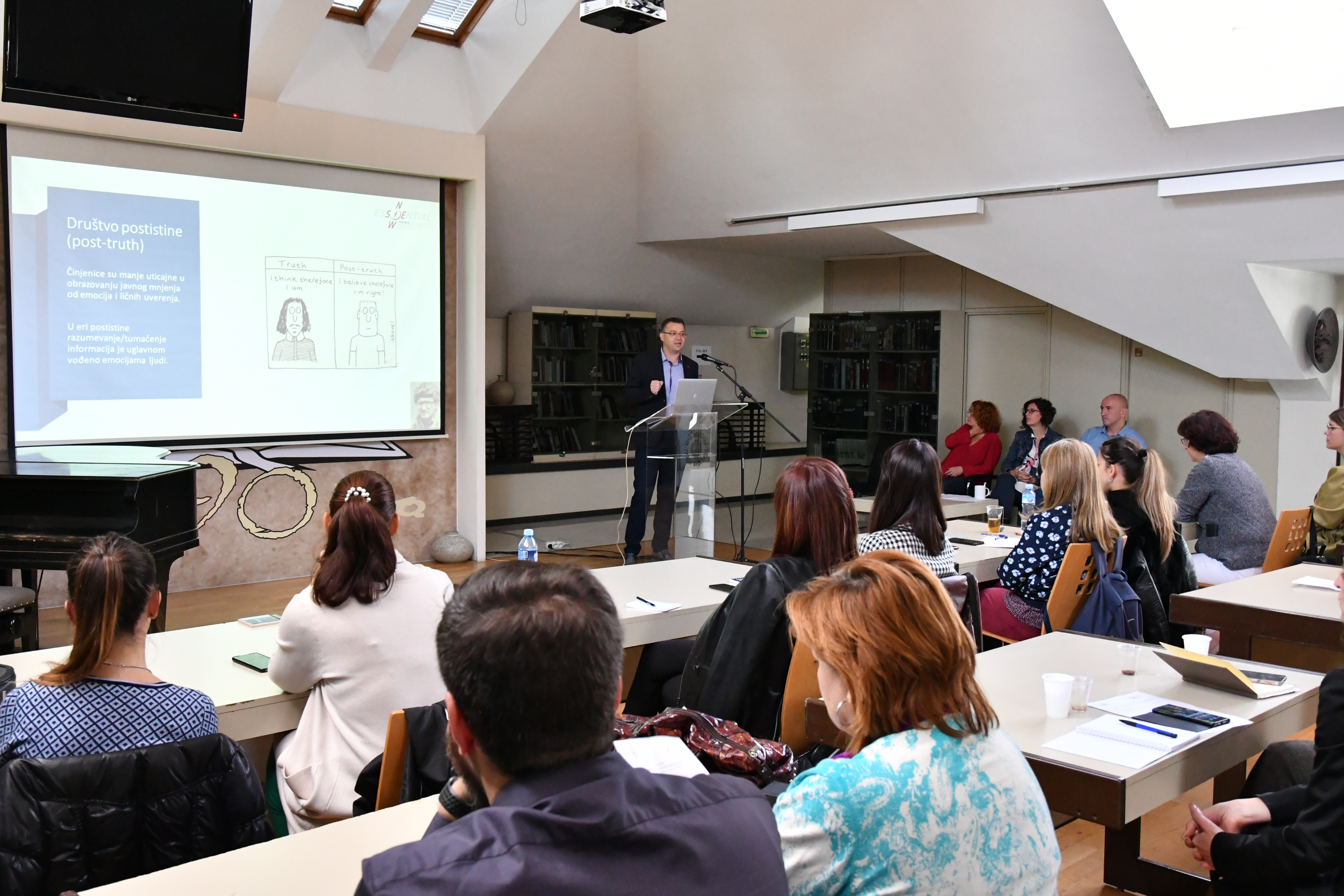
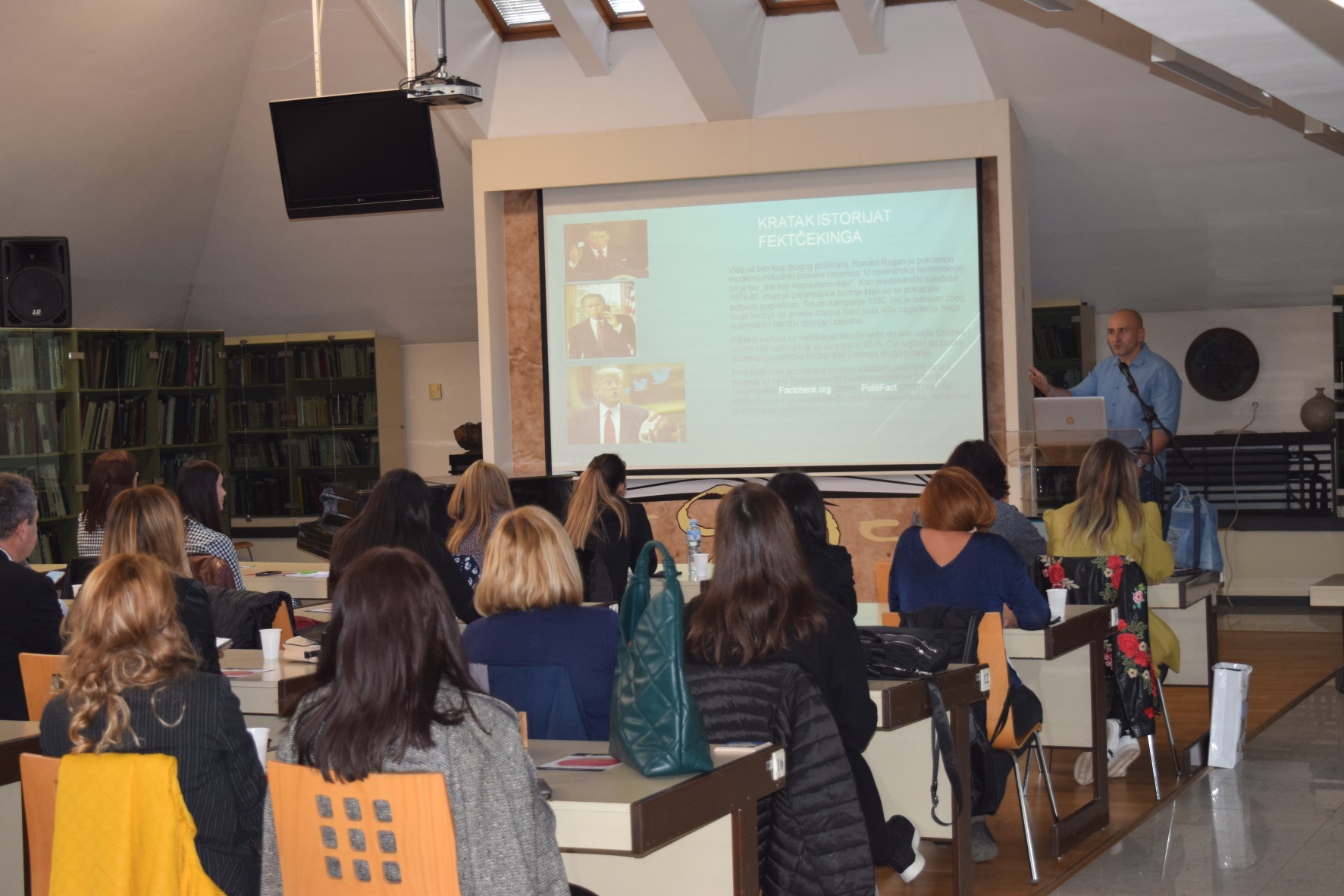
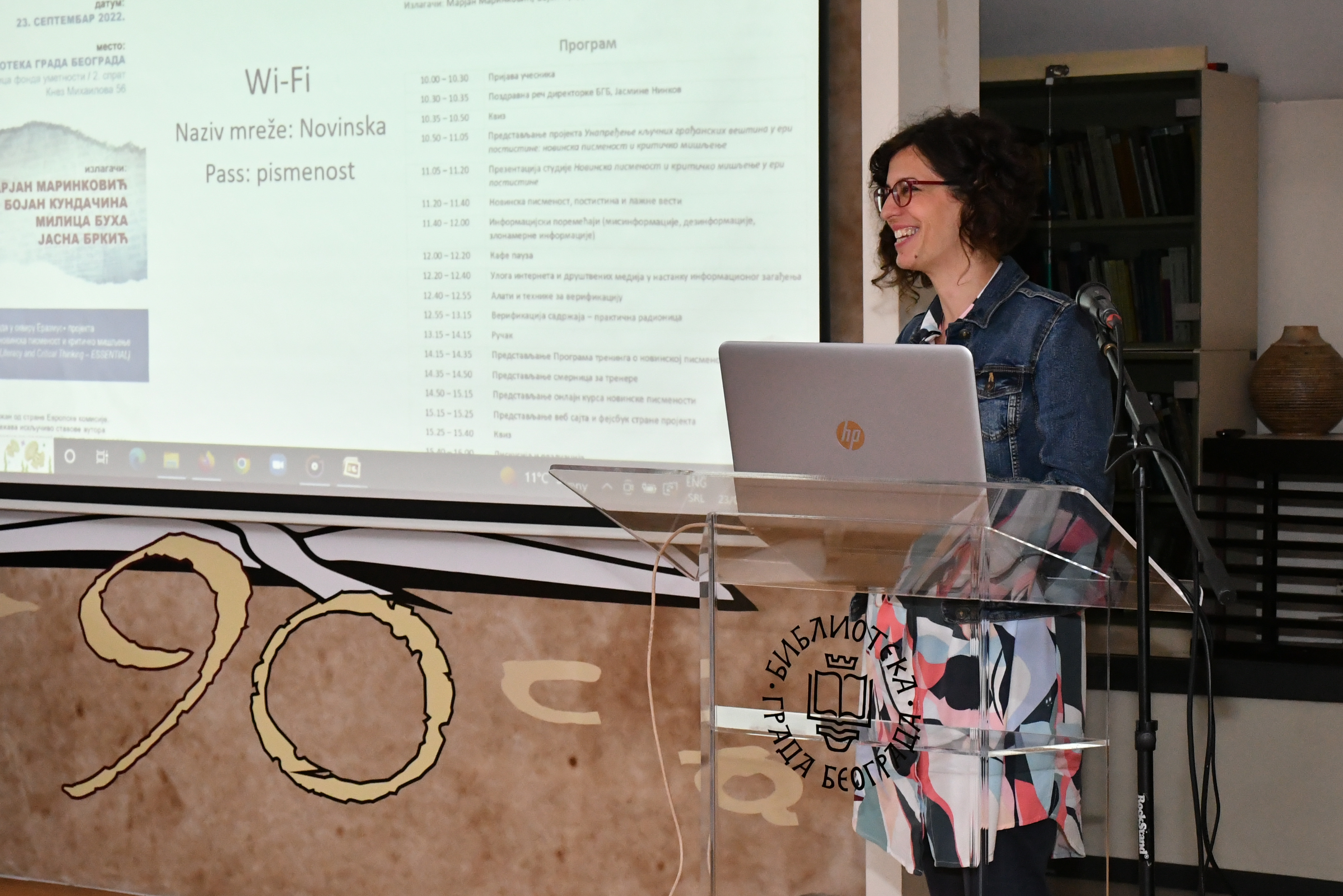
This two-year project ESSENTIAL, which ends on September 30, 2022, was jointly implemented by four partners – Belgrade City Library (Serbia), National Library of Latvia, Hacettepe University (Turkey) and UPI - ljudska univerza Žalec (Slovenia). Belgrade City Library (BCL) coordinated the entire project. The overall project objective is to contribute to the development of self-aware citizens who think critically and correctly understand media content.
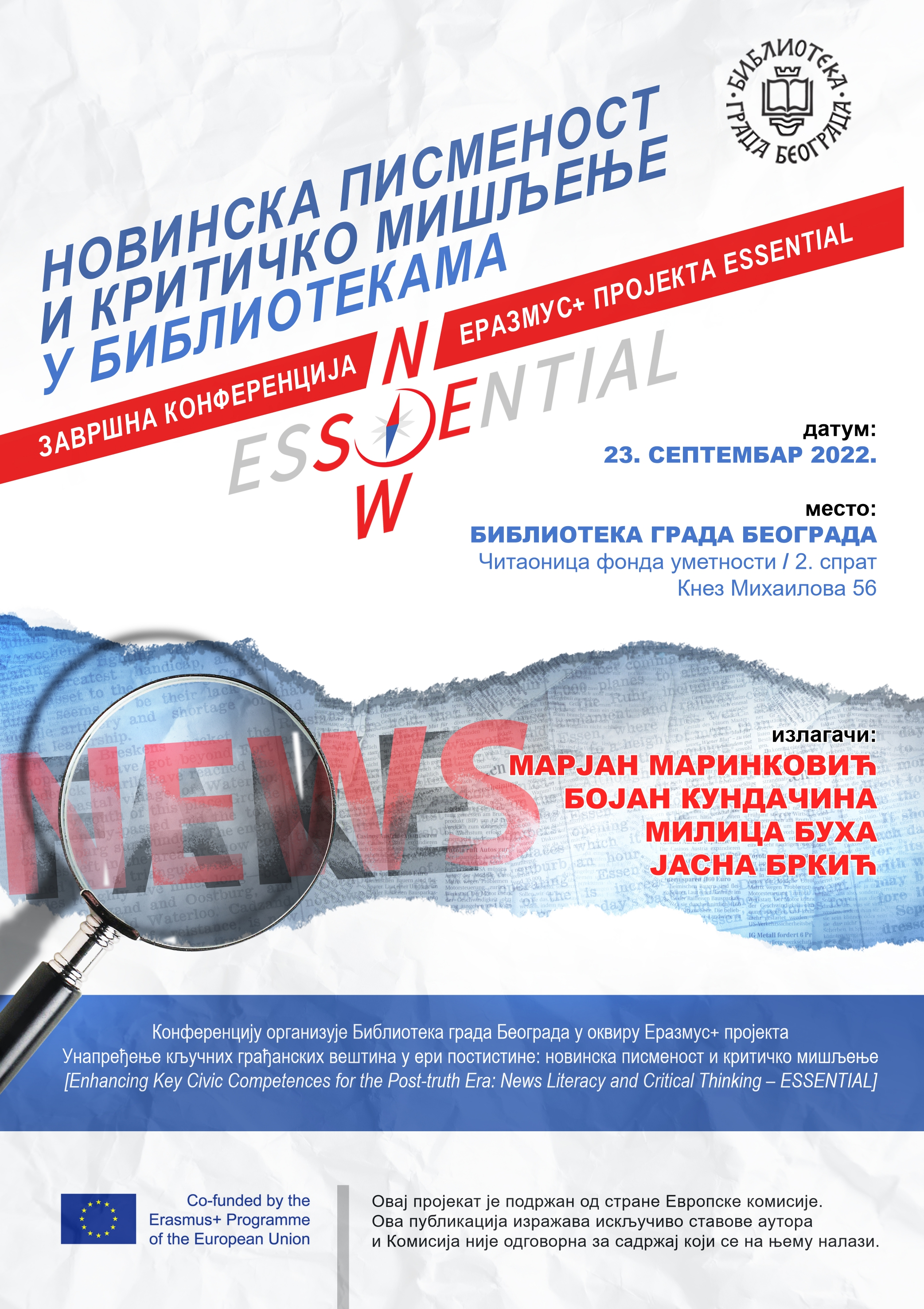
CITIZENS’ NEWS LITERACY IN THE BELGRADE CITY LIBRARY

Belgrade City Library has introduced a new innovative educational service. As part of the international Erasmus+ project, it has developed an online platform for education in news literacy and correct understanding of the news.
On the project's website newslitproject.net, there are two modules of the news literacy online course: one for all citizens and the second for educators (trainers, librarians, teachers, etc.). Access to the course is free and available 24/7, and users choose when, what and how much they will learn. Course participants will learn:
- About news literacy and its importance to an individual and society.
- How media and journalism influenced society in the post-truth era.
- How to recognize manipulative media techniques.
- How to identify fake news, photos, video content, and social media accounts.
- What is information disorder, and what is information pollution?
- What are algorithms, news feeds, filtered bubbles, and echo chambers?
- What is the difference between bots, trolls, and cyborgs?
- How to find sources of reliable source information and how effectively to search the Web.
... and many more things that will significantly improve the quality of understanding of the news and the use of social networks.
A particular version of the course has been developed for those who want to become trainers
in
this field. This course contains general guidelines and detailed instructions for conducting
news
literacy workshops.
In addition to the online content, you can download the complete training course and
guidelines
for trainers in PDF format from the project's website newslitproject.net. All materials
are
licensed under Creative Commons and, as such, are free to download and use, provided the
source is acknowledged.
News Literacy Online Training Course was developed within the international Erasmus+ project
Enhancing Key Civic Competences for the Post-truth Era: News Literacy and Critical Thinking
(ESSENTIAL), with financial support from the European Commission. This two-year project,
which ends this month, was jointly implemented by four partners – Belgrade City Library
(Serbia), National Library of Latvia, Hacettepe University (Turkey) and UPI - ljudska
univerza
Žalec, (Slovenia). Belgrade City Library (BCL) coordinated the entire project. The overall
project
objective is to contribute to the development of self-aware citizens who think critically
and
correctly understand media content.
In addition to online training, resources for launching in-person workshops were also built
within the project. Selected BCL librarians underwent news literacy training for trainers,
after
which they held several seminars at the library's premises. The intention is that
through an
accredited program, these trained librarians also educate their colleagues throughout
Serbia, so
that the education of citizens in news literacy can be started in as many libraries as
possible.
Improving citizens' news literacy through libraries is a modern trend in world
librarianship. BCL
is one of the pioneers in this field. In this sense, BCL representatives were invited to
present
the project in Oslo this May at one of the world's most significant gatherings - the
IFLA MetLib
conference, which brings together representatives of the world's largest public
libraries.
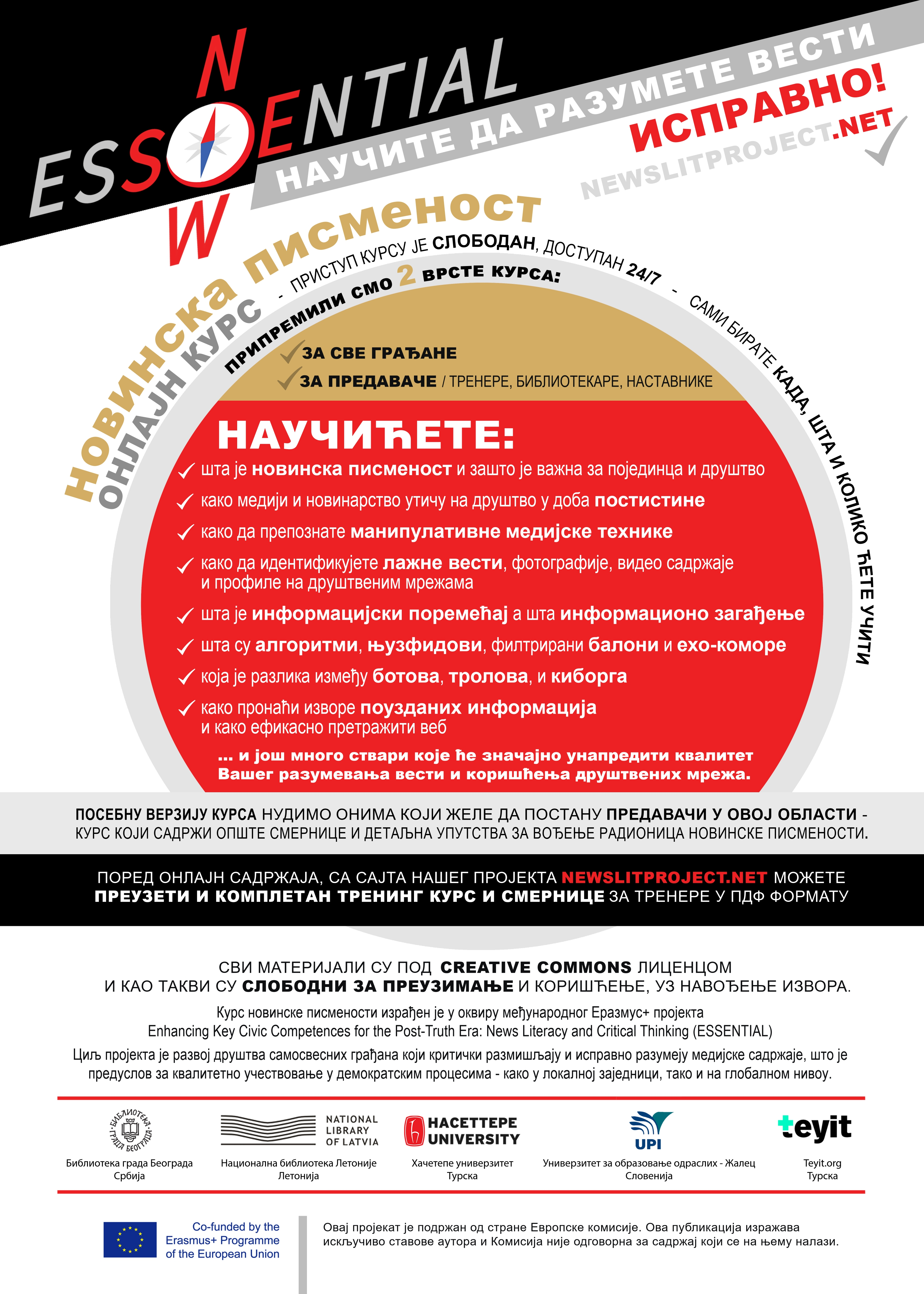
NEWS LITERACY TRAINING FOR ADULTS HAD BEEN CARRIED OUT
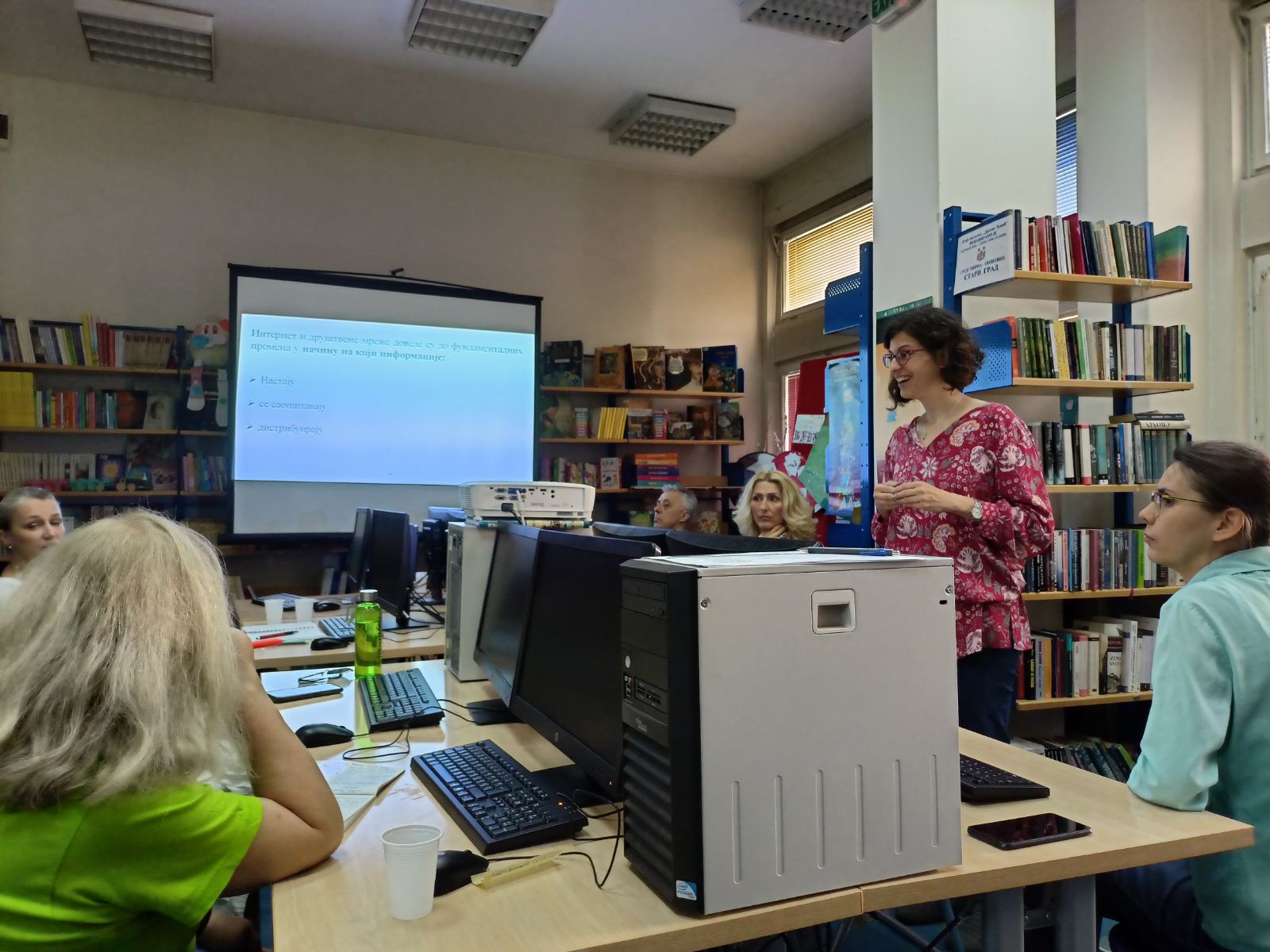
As part of the ESSENTIAL project, news literacy training sessions for adults were implemented in Serbia, Turkey, Slovenia and Latvia. In addition to educating citizens, these one-day training sessions aimed to test the developed intellectual products of the project - Training Course Curriculum and Guidelines for Trainers.
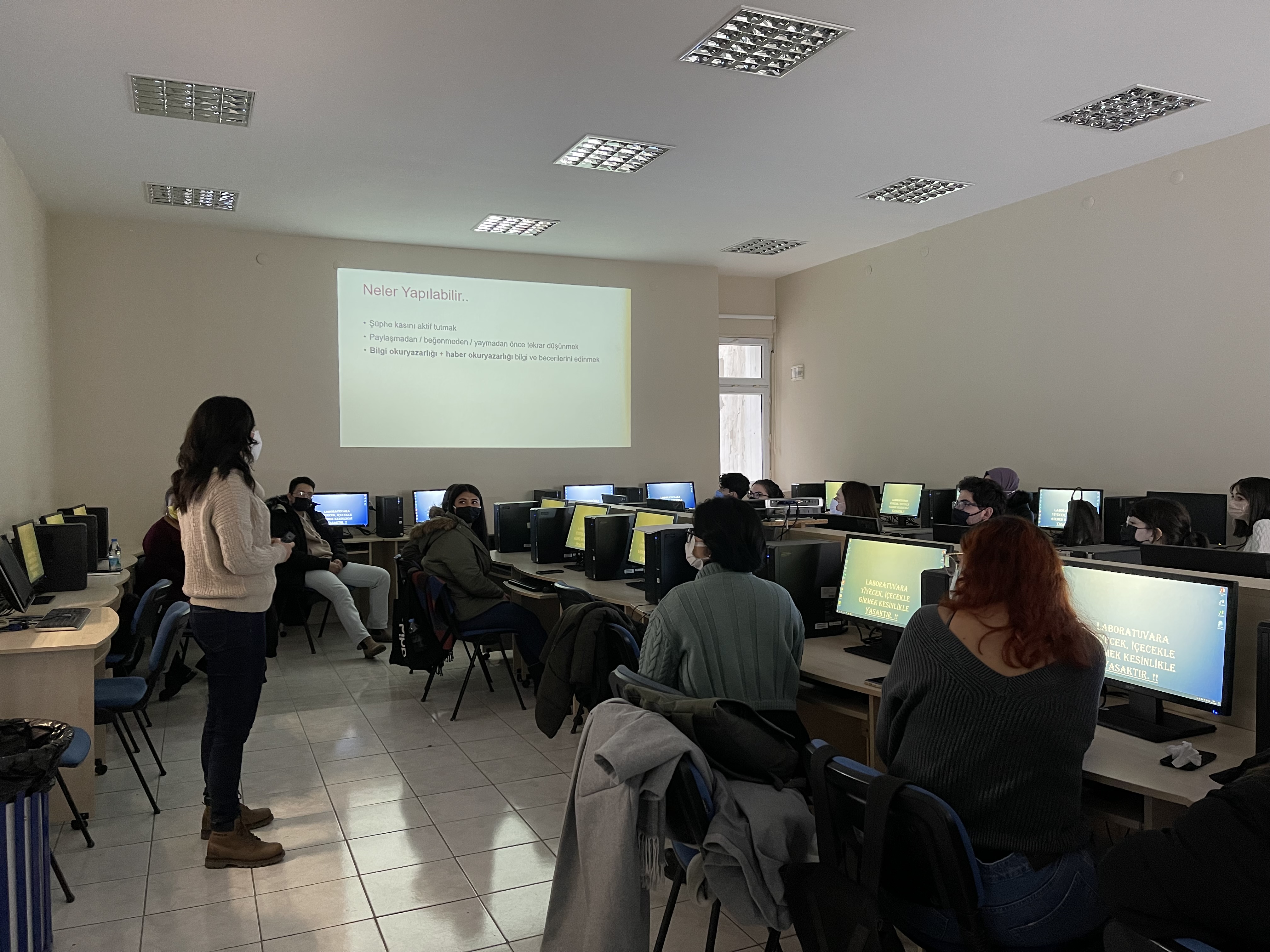
Each of the partners in the project had conducted the training for its primary target group. Adult Education Centre - UPI Žalec organised the training for the elderly, Hacettepe University from Ankara for students, and the National Library of Latvia for librarians and other interested parties. The Belgrade City Library organised the training for three groups of participants, 28 of them in total. The workshops were held in the e-classroom of the Library “Dragan Lukić”, Studentski trg 19.
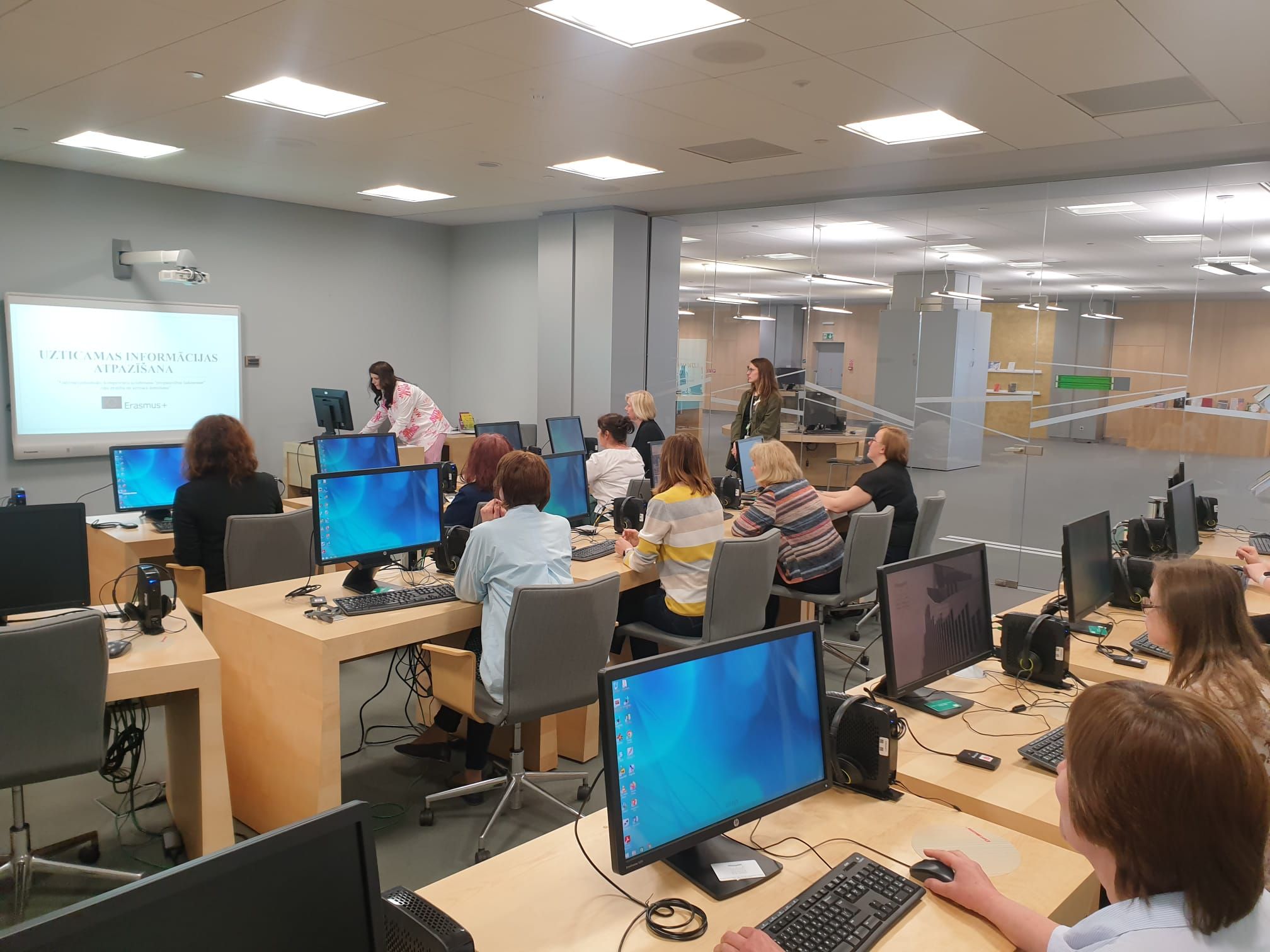
The general conclusion is that the participants responded very well to the prepared materials and how the training was conducted. Significant feedback was received from the participants and the trainers, based on which the revision and improvement of news literacy training will be carried out.
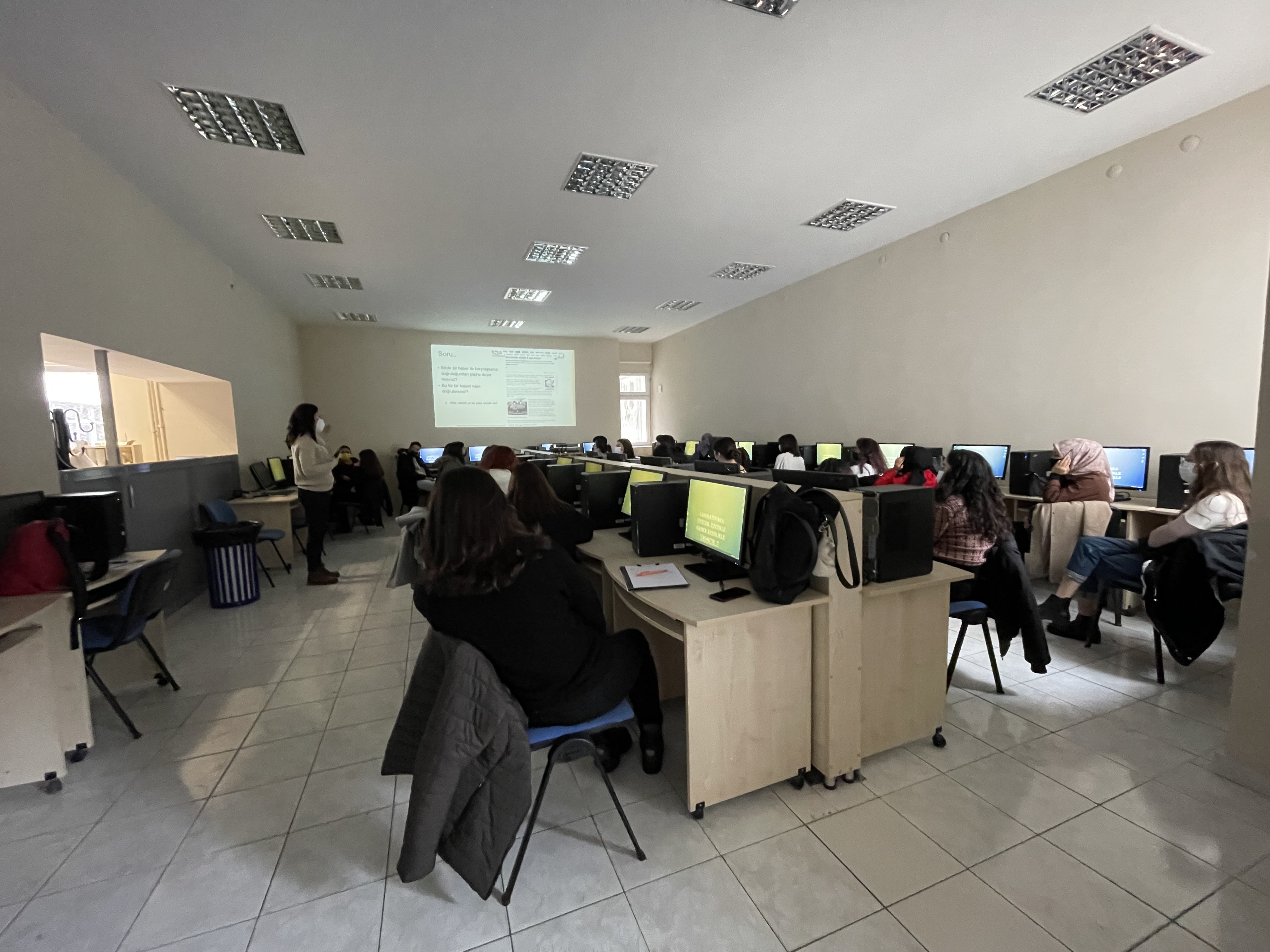
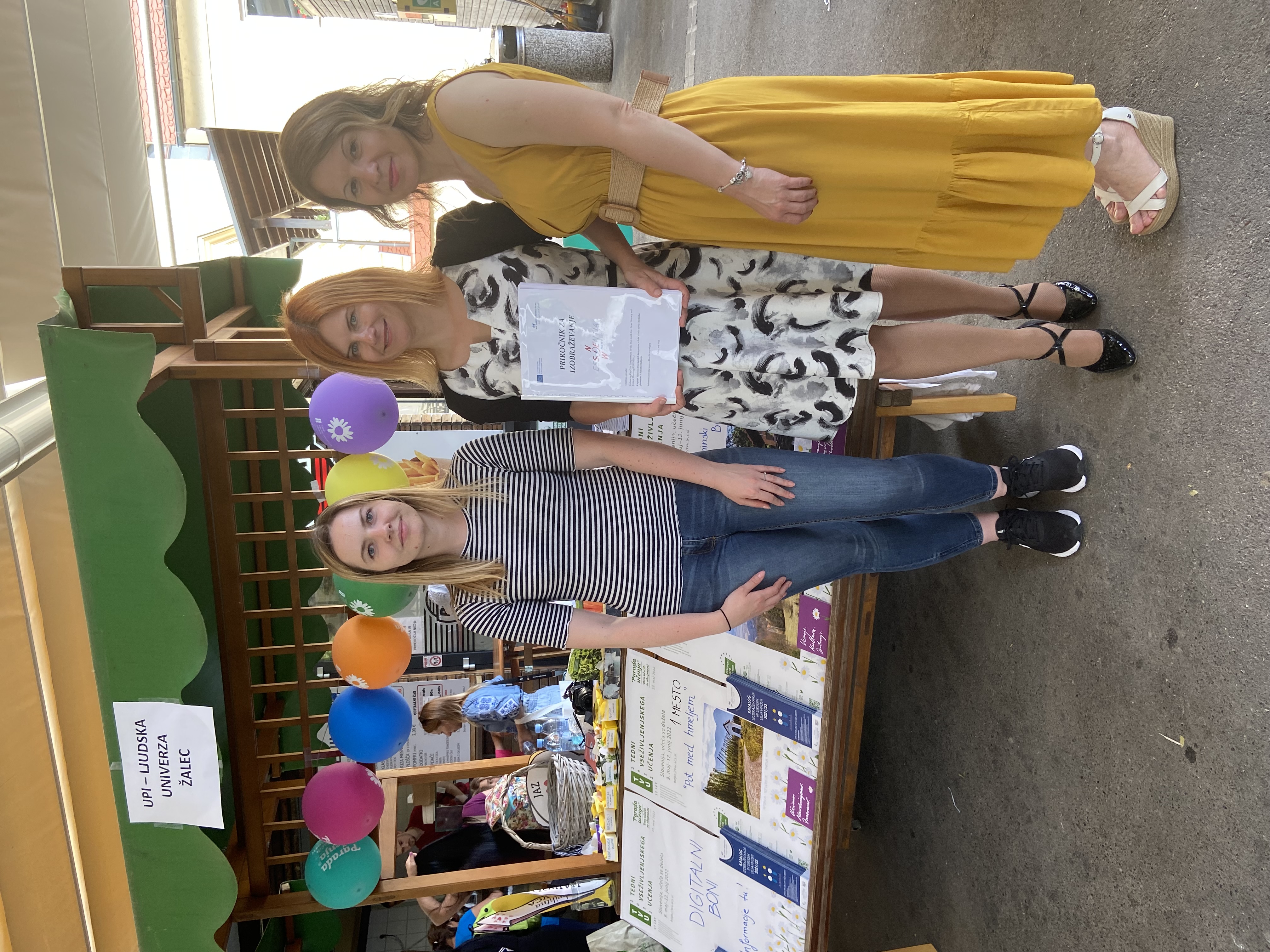
The project is implemented within the Erasmus+ program with the support of the European Commission.
THE THIRD PROJECT MEETING WAS SUCCESSFULLY ORGANISED
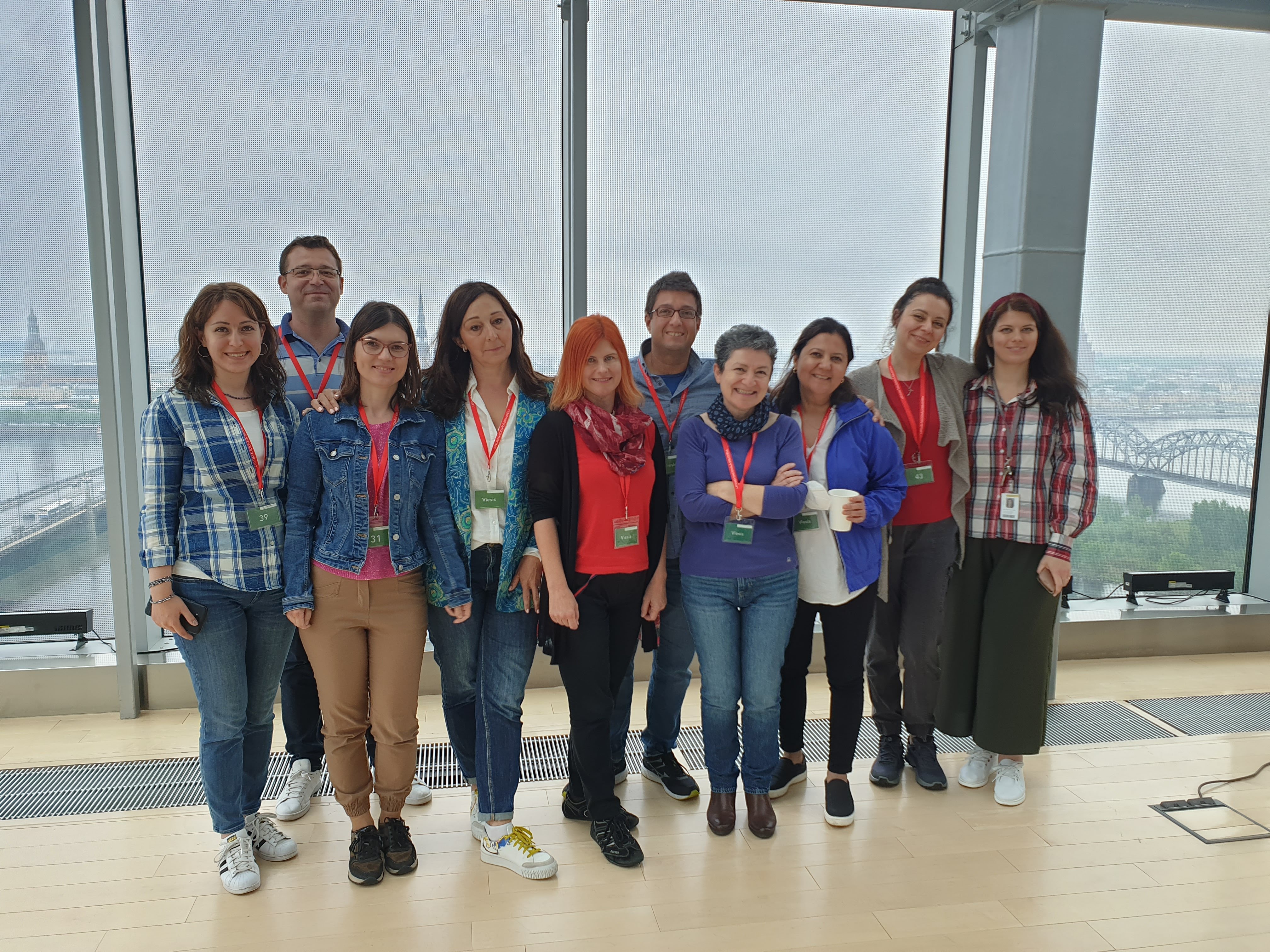
As part of the ESSENTIAL project dedicated to news literacy, the Third transnational meeting was successfully organized and held in the National Library of Latvia on June 8 and 9, 2022.
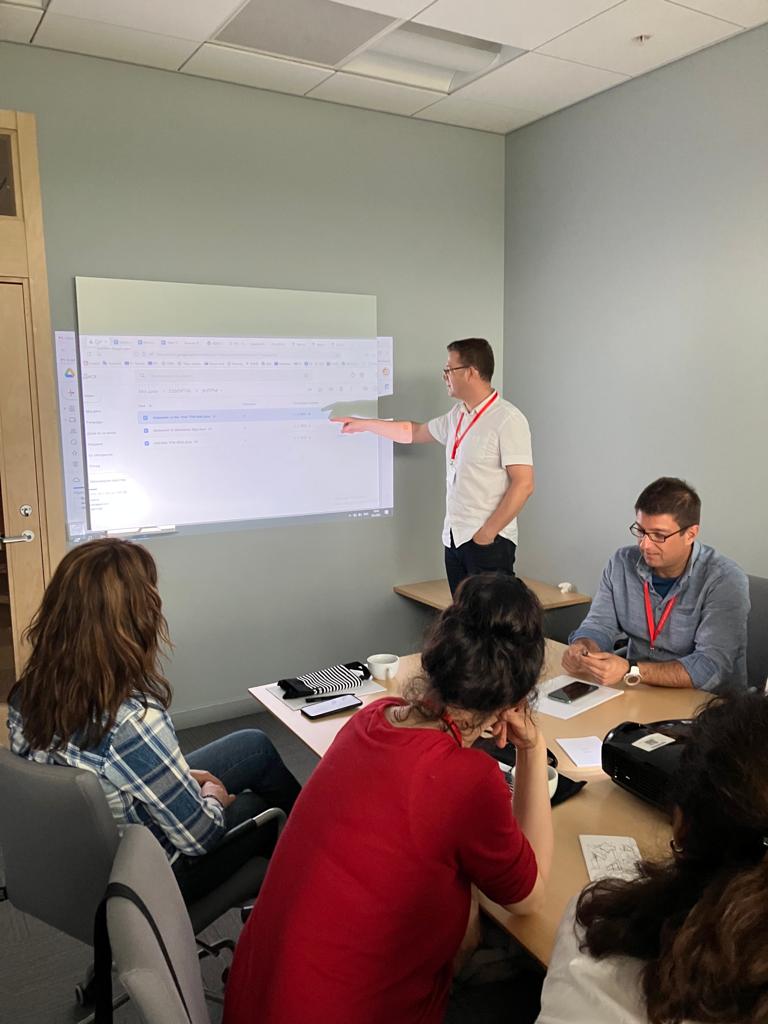
A total of 12 people attended the meeting – two representatives of partners from Slovenia, five from Turkey, three from Latvia, and three representatives from Serbia, from the Belgrade City Library, which coordinates the project:
- UPI Žalec - Adult Education Centre: Tina Baloh, Marjana Rogel Persic
- National Library of Latvia: Guna Ulmane, Juta Žvira-Kundrāta, Saiva Cakure
- Belgrade City Library: Marjan Marinkovic, Milijana Jokic
- Hacettepe University: Serap Kurbanoglu, Yurdagul Unal, Orcun Madran, Irem Soydal, Ipek Sencan
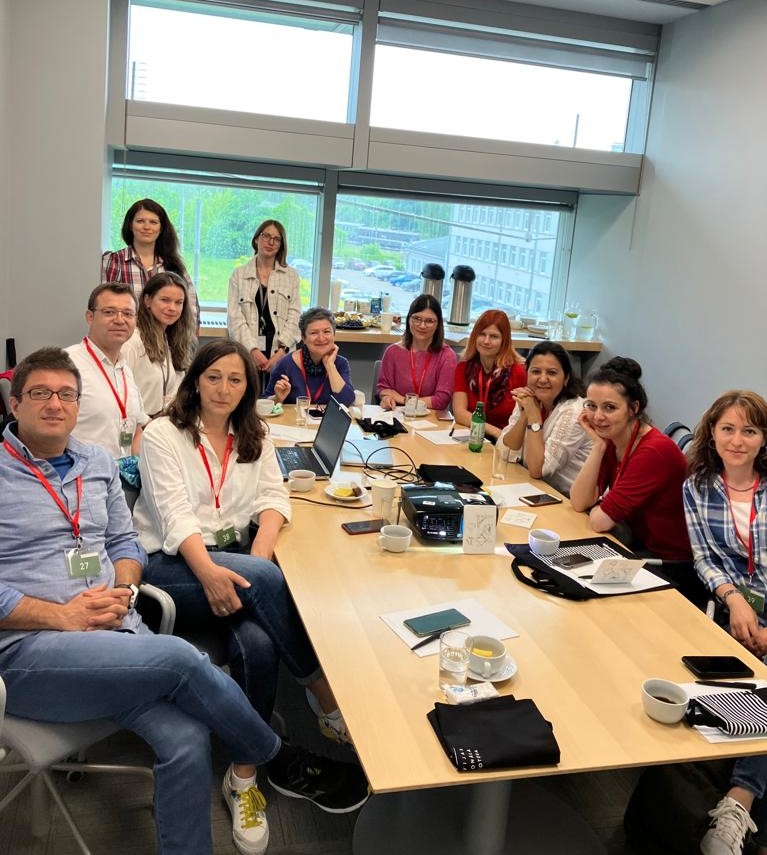
The meeting lasted two days and was particularly informative, covering several topics essential for the project: project management, financial management, reporting, monitoring and evaluation, implementation of upcoming activities, project promotion, deadlines, and creation of online courses. Participants paid attention to the forthcoming dissemination meetings where the project results will be presented, including promotional activities and the project's sustainability plan. A tour of the National Library of Latvia, completed in 2014 and one of the most beautiful libraries in Europe, was also organized.
The project is implemented within the Erasmus+ program with the support of the European Commission.
PROJECT ESSENTIAL PRESENTED AT IFLA METLIB 2022 CONFERENCE

The annual IFLA MetLib Conference, organized by the IFLA Metropolitan Libraries Section, was held in May at the Oslo Public Library, known as Deichman Bjørvika. Over 120 participants from libraries of major cities worldwide (New York, Amsterdam, Los Angeles, Helsinki, Prague, Barcelona, Rotterdam, Montreal, Belgrade, etc.) attended this most significant international conference that focuses on public libraries.
The theme of the conference was "Fostering Resilient Cities". It addressed the issue of how public libraries support their communities during times of crisis and challenge. Belgrade City Library representatives Jasmina Ninkov and Marjan Marinković participated in a seventy-minute panel entitled "The resilient library – a trustworthy source in times of crisis". During the panel, they presented the international project ESSENTIAL, dedicated to strengthening the news literacy of citizens. Belgrade City Library (BCL) is successfully bringing this project to an end with the support of the European Union and as part of the Erasmus + program. In addition to the representatives of BCL, Lotta Muurinen from the Helsinki City Library and Jamie Johnston, professor in the Department of Archivistics, Library and Information Science at the University of Oslo, took part in the panel discussion. They discussed the importance of news literacy today and the ability of libraries to provide credible information to citizens and be a safe place to exchange views on crucial issues for the community.
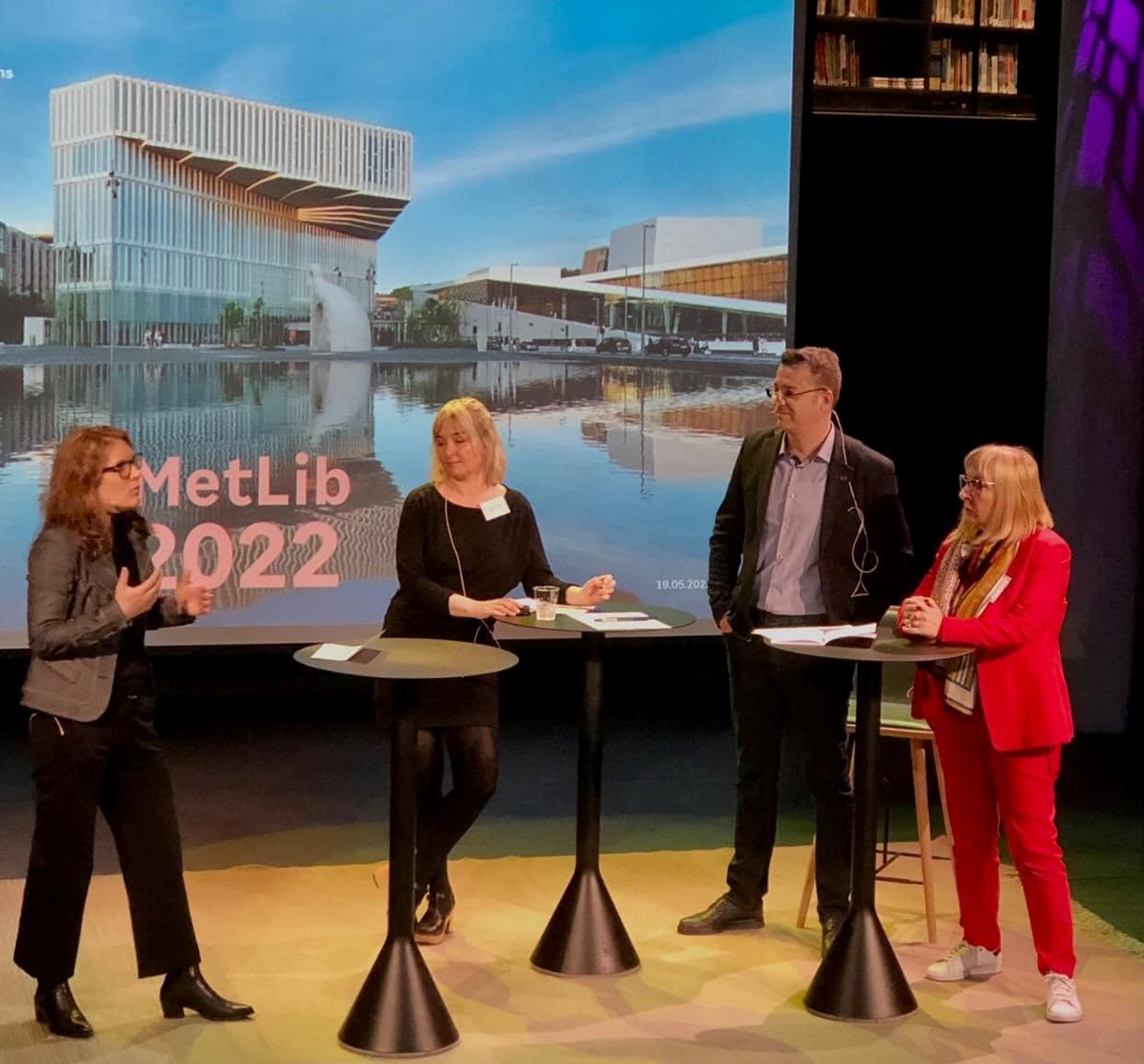
The project ESSENTIAL and its main results – a website and an online course dedicated to news literacy – have attracted great interest among conference participants. Many colleagues have expressed a desire to apply these educational tools in their work.
During the conference, an expert visit was organized to the Deichman Bjørvika Library, the world's best public library by IFLA in 2021 and the other award-winning public libraries from the Oslo Public Library network.
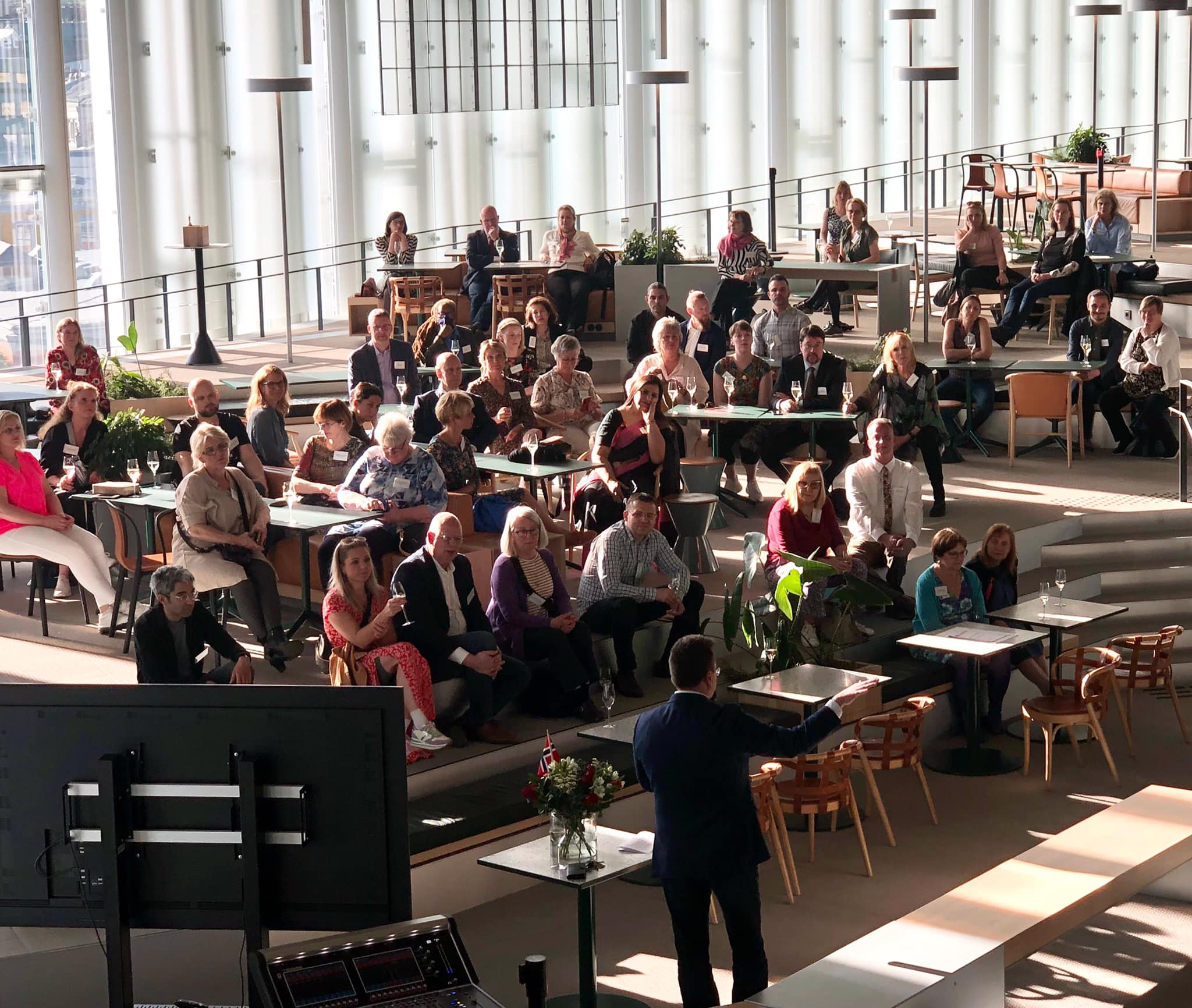
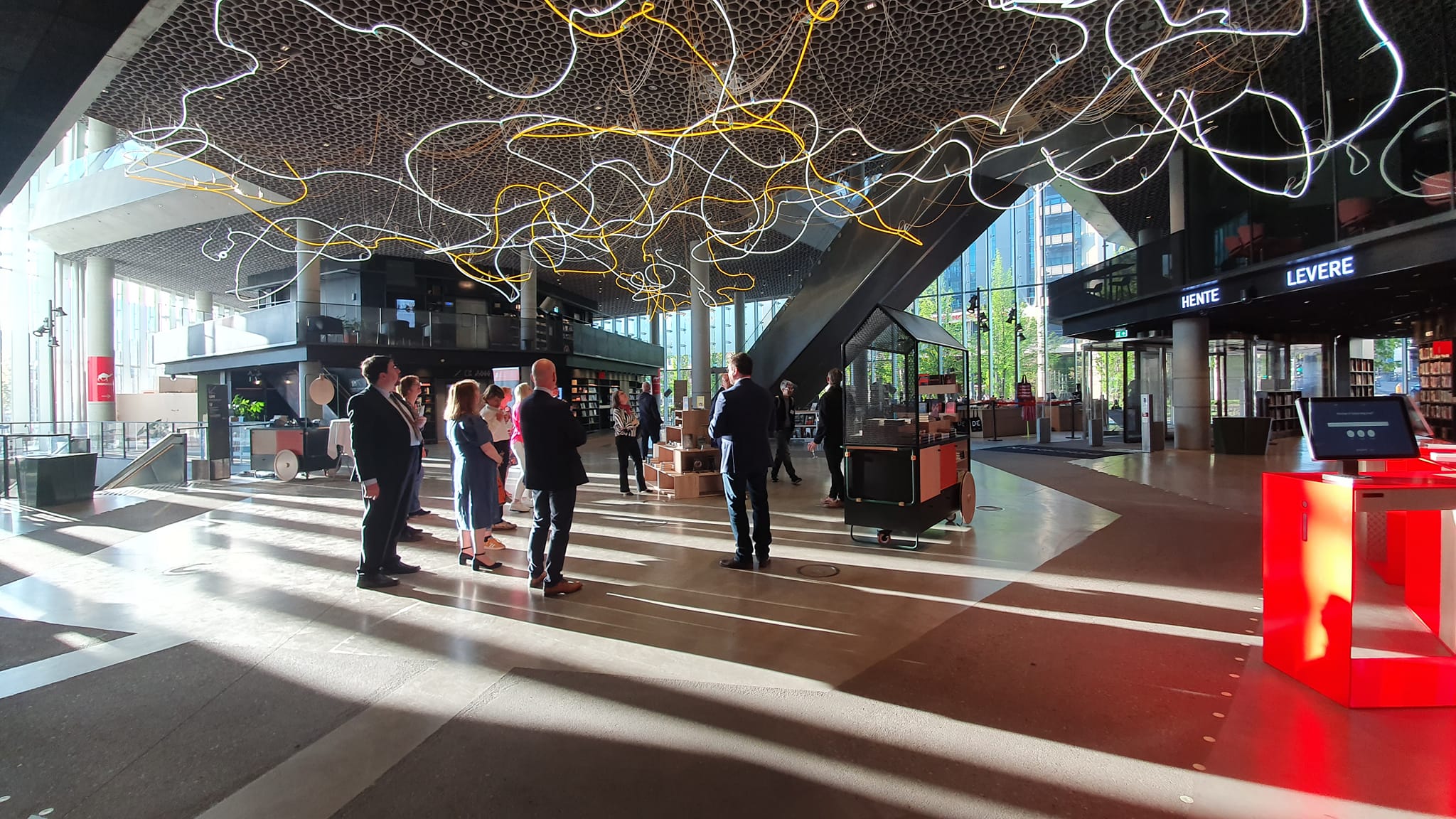
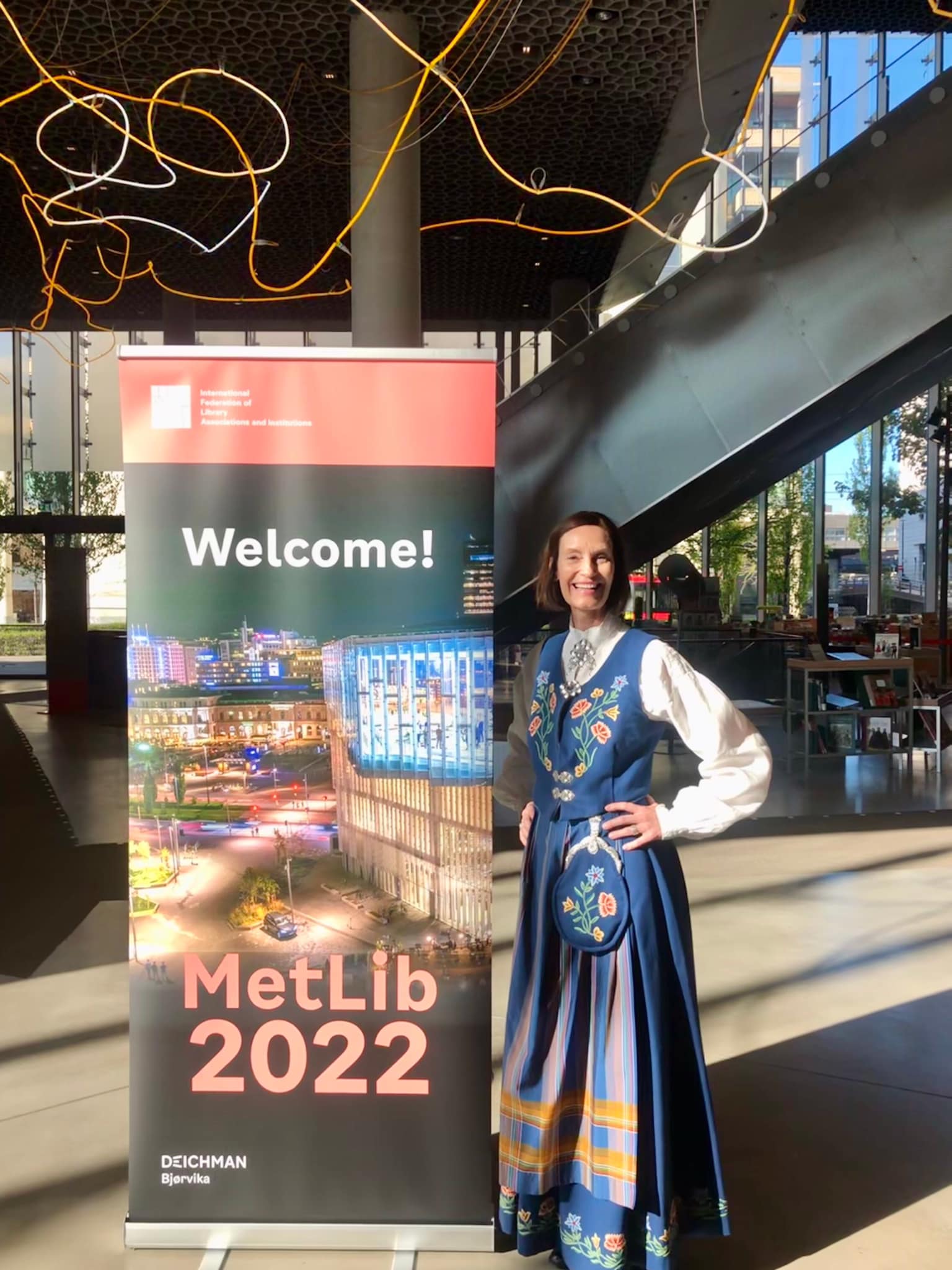
NEW TRAINERS RECEIVE TRAINING IN NEWS LITERACY
From April 5th to 7th, training for trainers within the ESSENTIAL project took place in Žalec, Slovenia. Participants were trained to organize and conduct workshops on news literacy, and they were provided with materials for creating presentations.
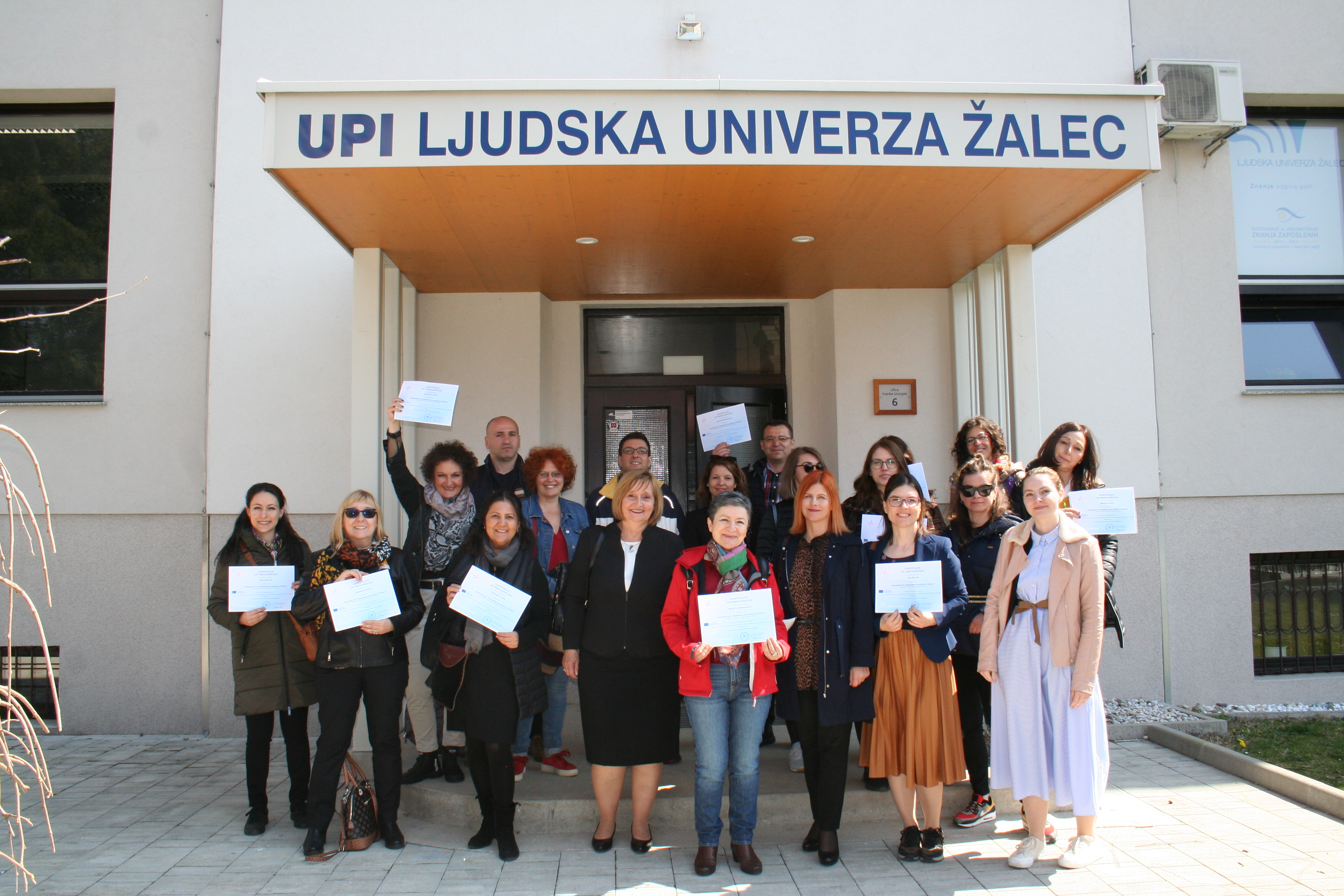
As part of the training, 21 participants from the following partner institutions were trained:
- Belgrade City Library (Serbia)
- UPI Žalec - ljudska univerza Žalec (Slovenia)
- National Library of Latvia (Latvia)
- Hattecepe University (Turkey)
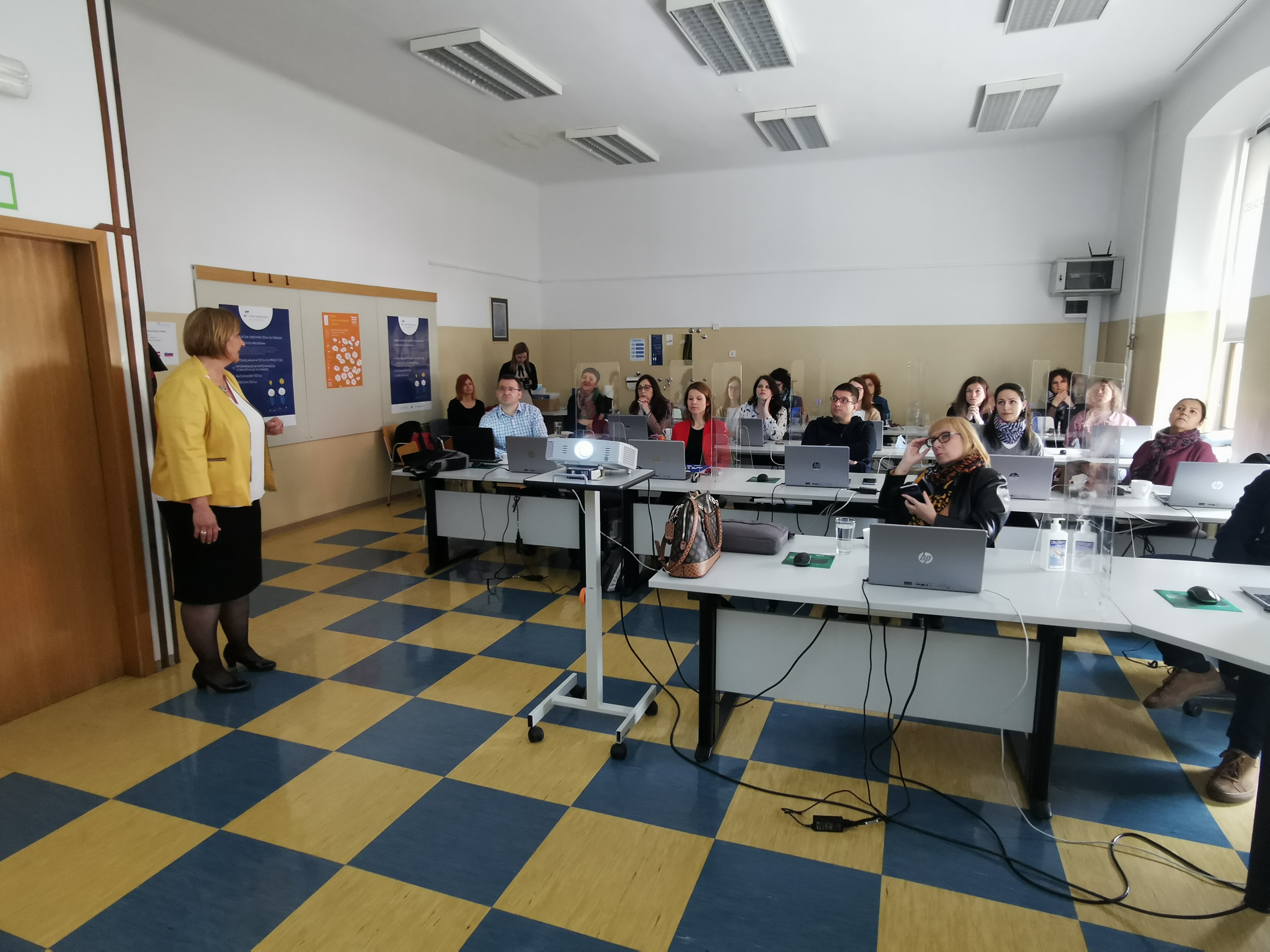
A total of seven librarians from the Belgrade City Library received certificates for holding
training in news literacy, which built human capacity for the library's engagement in
educating citizens on this subject.
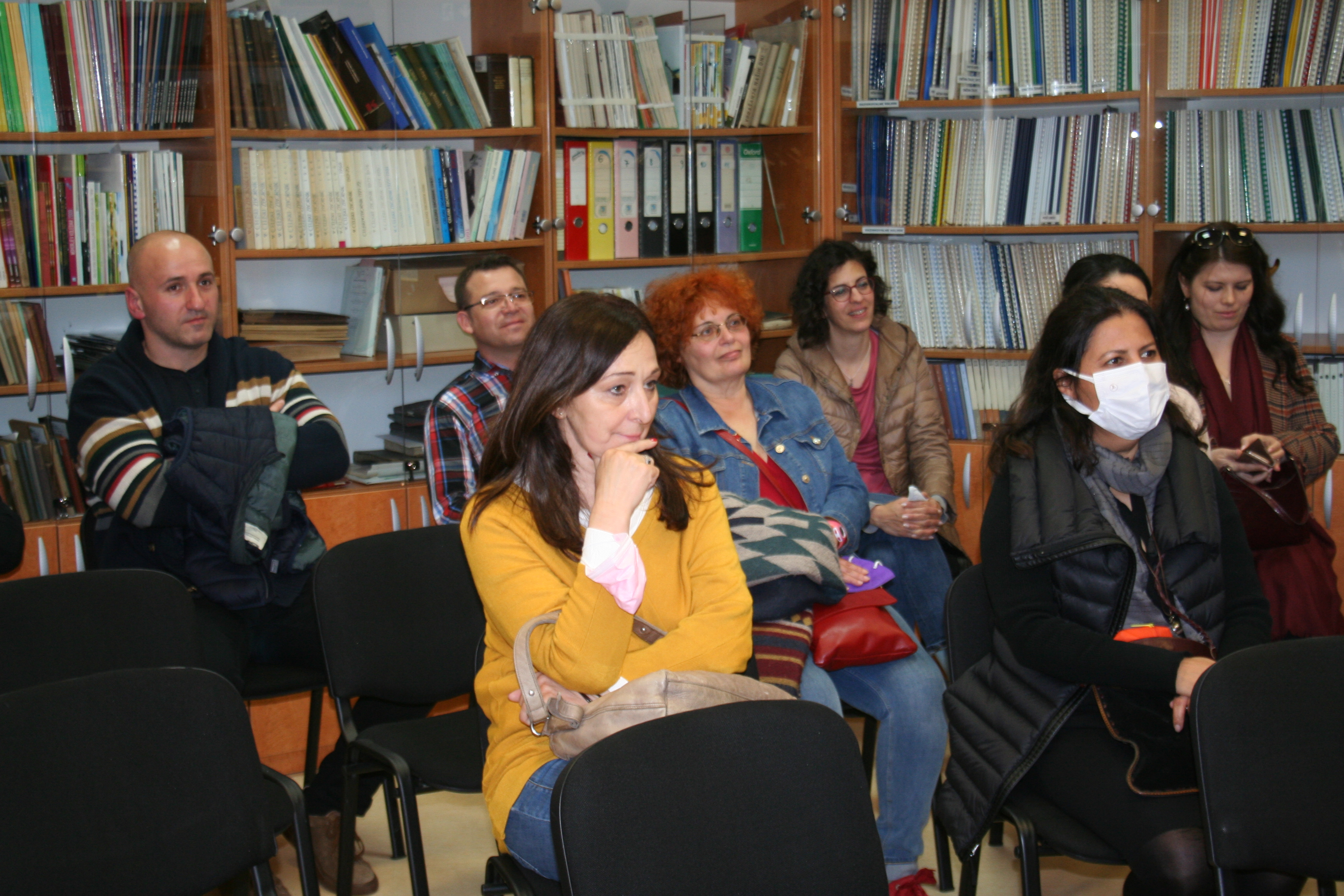
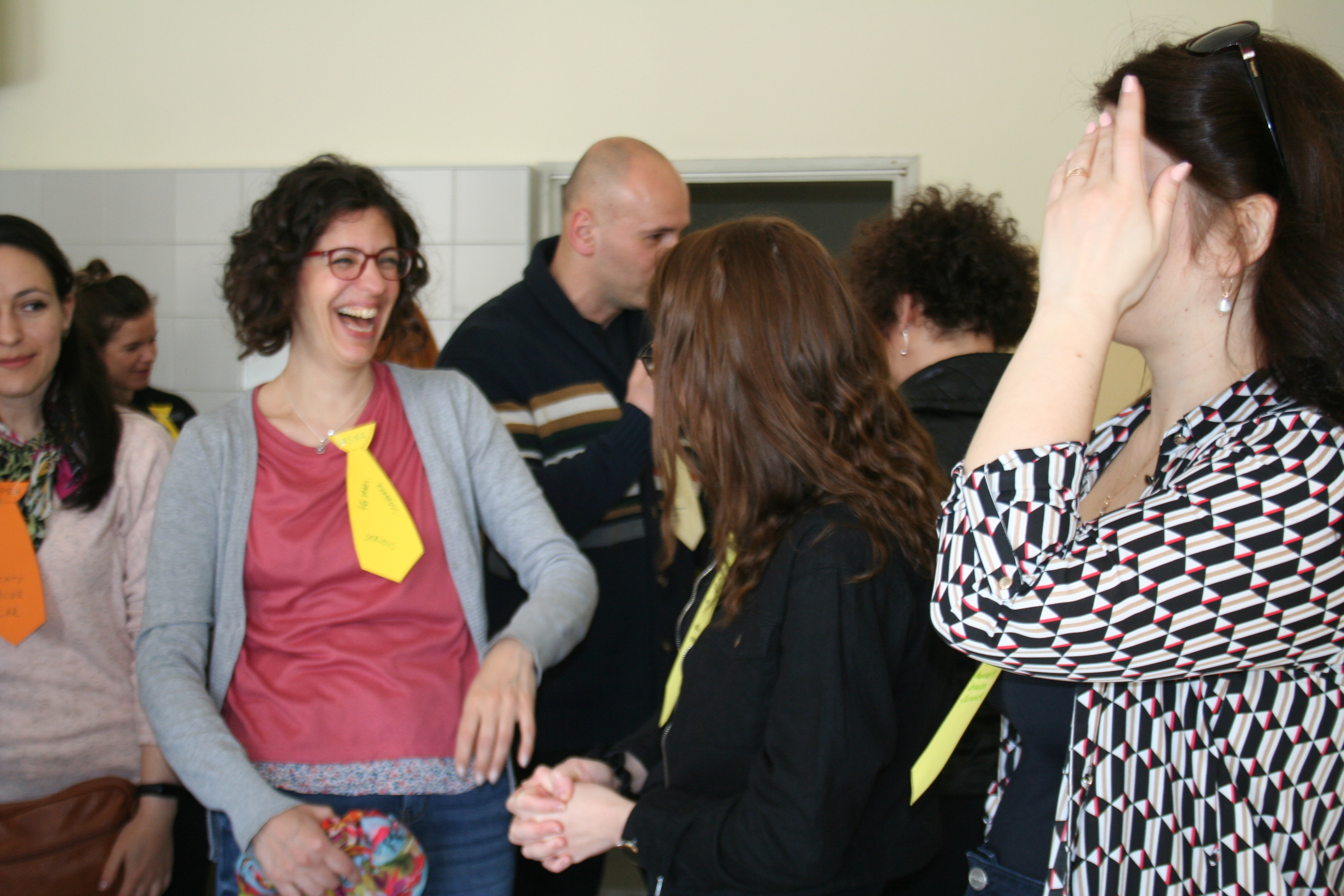
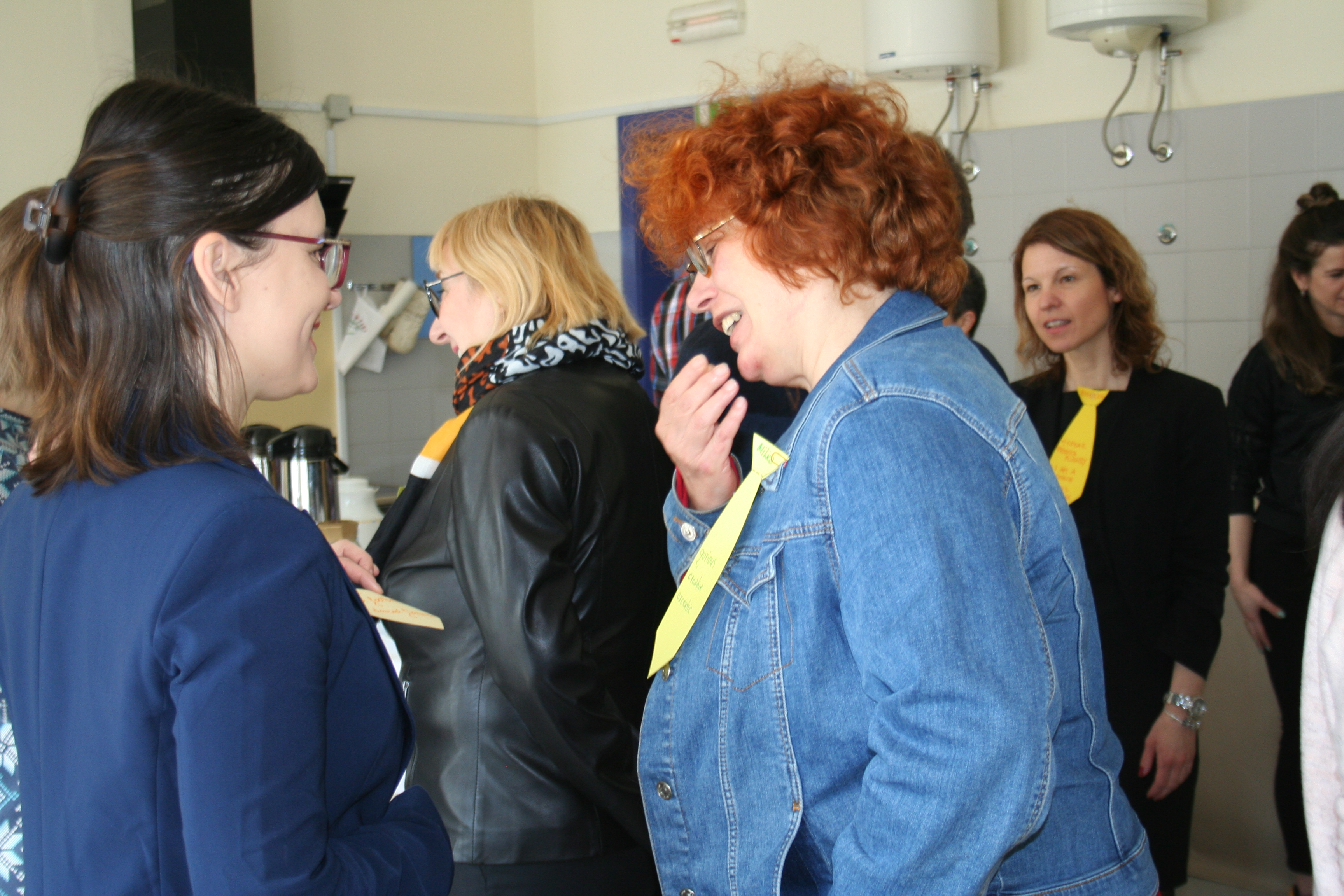
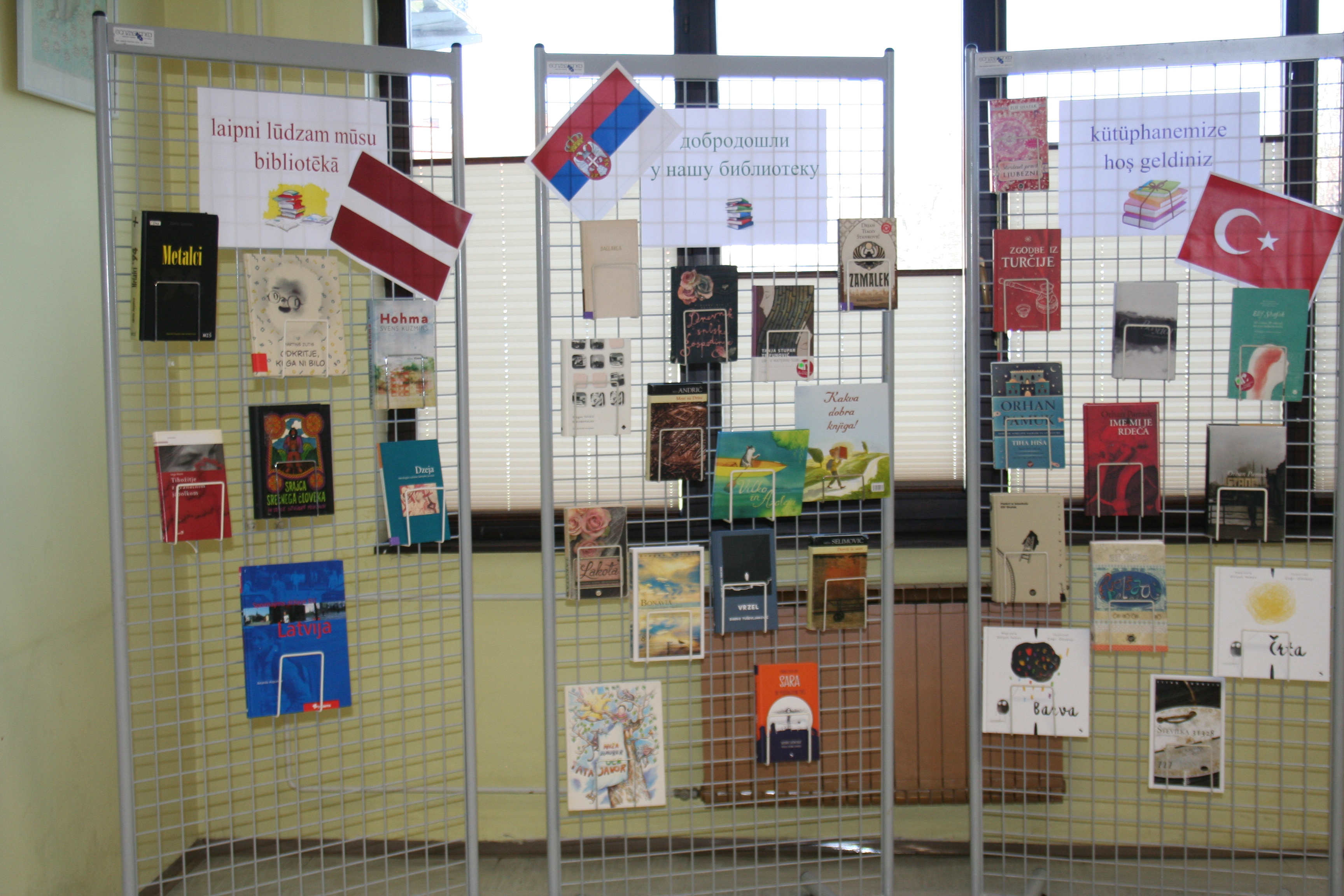
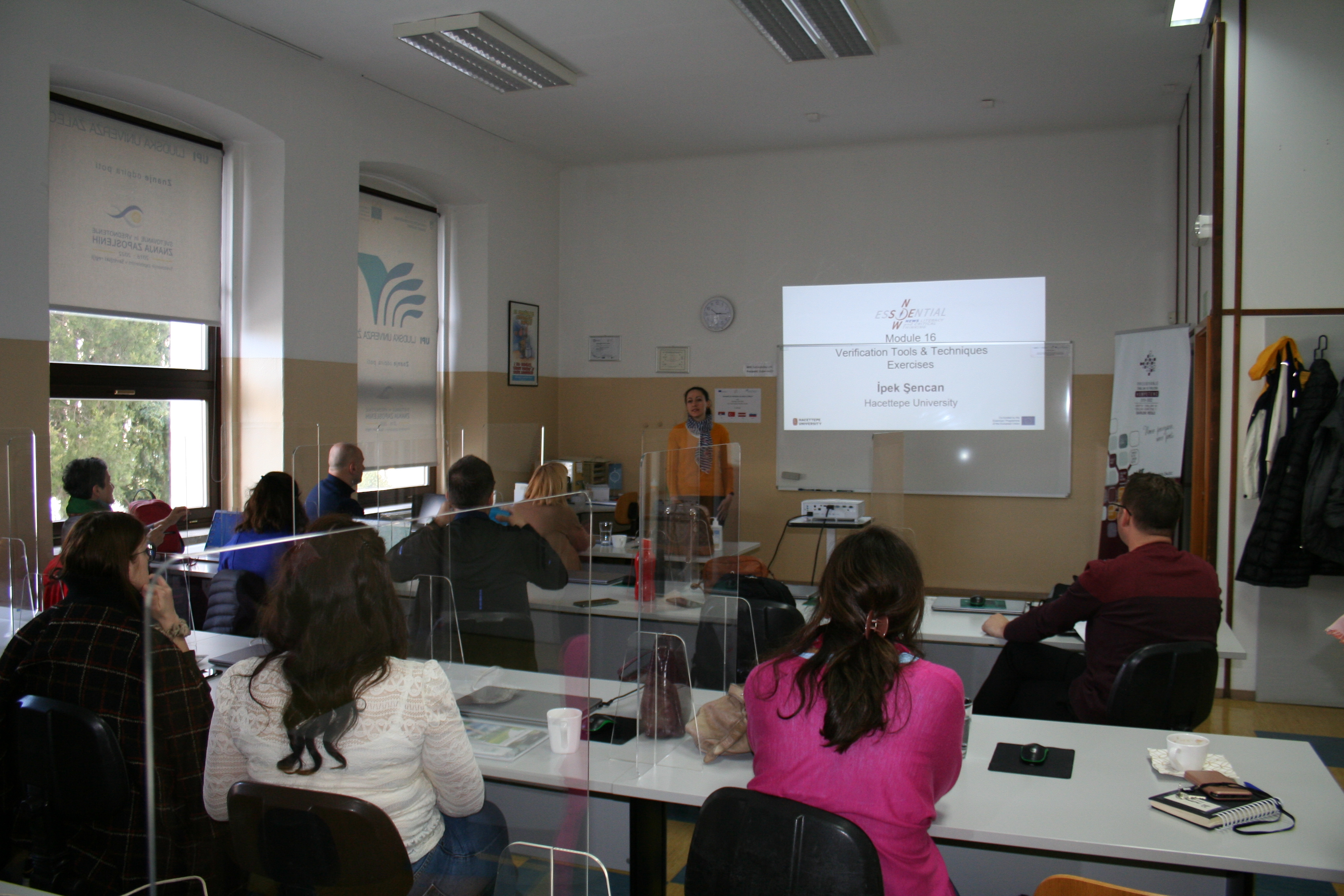
The ESSENTIAL project is implemented under the Erasmus+ Programme, with the support of the European Commission.
THE SECOND PROJECT MEETING WAS SUCCESSFULLY ORGANISED
The second transnational project meeting was successfully organised as part of the ESSENTIAL project dedicated to news literacy. The meeting was held at the Hattecepe University in Ankara on March 1st and 2nd, 2022.
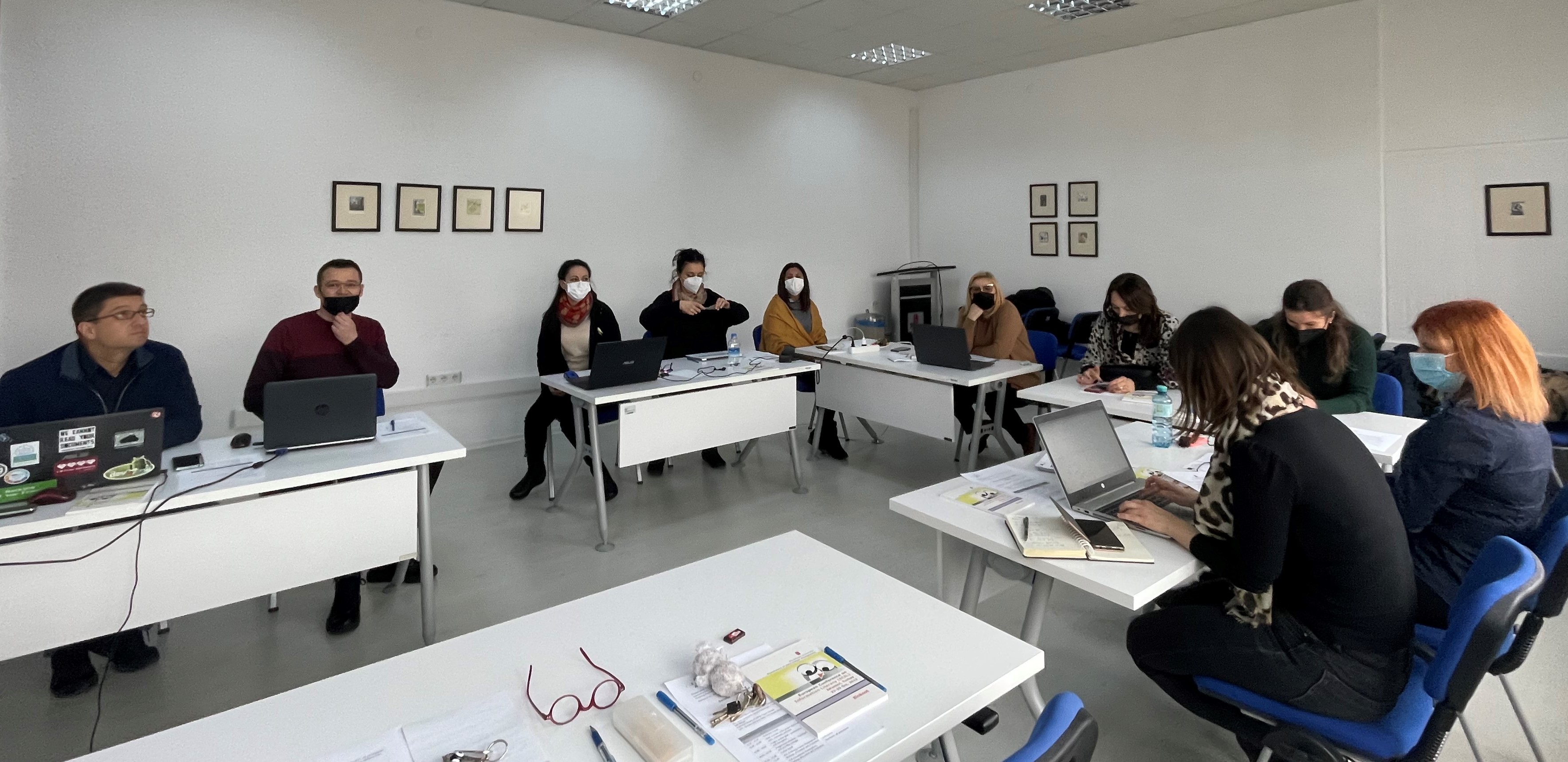
Eleven people attended the meeting - two representatives of the partner from Slovenia, one from Latvia, five from Turkey and three representatives from Serbia from the Belgrade City Library, which coordinates the entire project:
- UPI Žalec - ljudska univerza Žalec: Tina Baloh, Marjana Rogel Peršič
- National Library of Latvia: Guna Ulmane
- Belgrade City Library: Jasmina Ninkov, Marjan Marinkovic, Milijana Jokic
- Hattecepe University: Serap Kurbanoglu, Yurdagul Unal, Orçun Madran, İrem Soydal, İpek Şencan
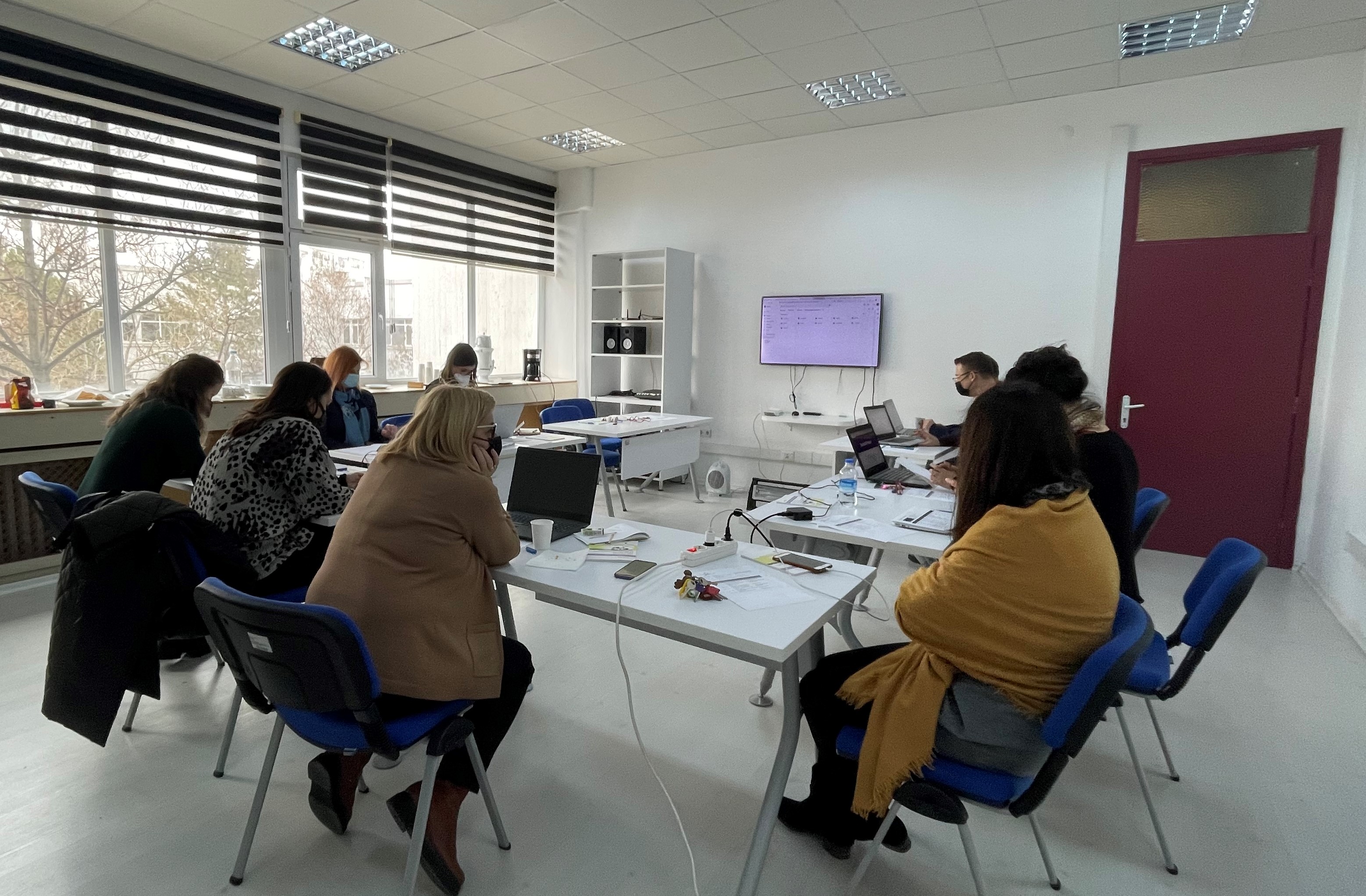
The meeting lasted two days and was very informative and productive, covering several topics
essential for the project: project management, financial management, reporting, monitoring
and
evaluation, implementation of upcoming activities, project promotion, deadlines, and online
courses. Our host also organised a tour of the University campus and library.
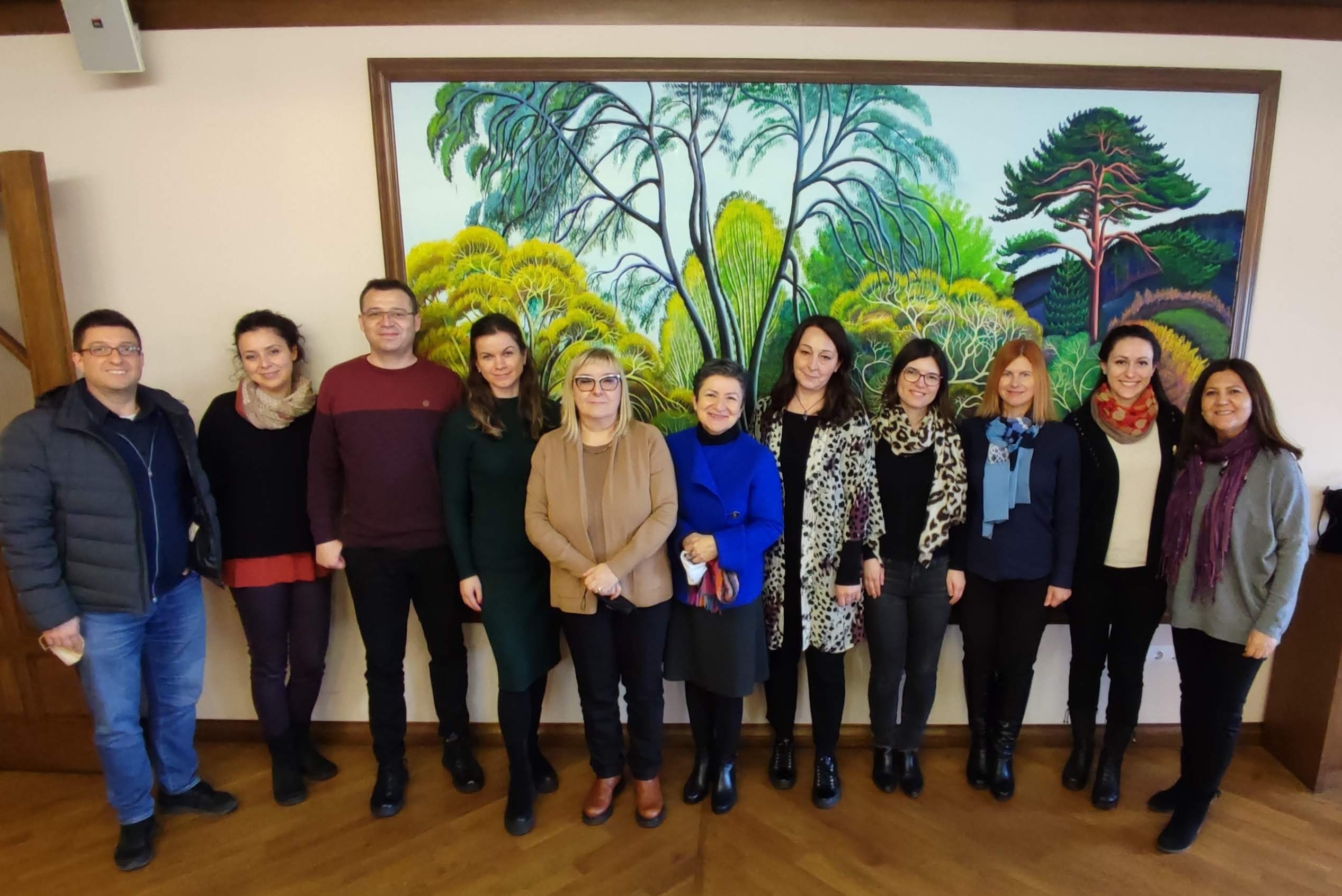
The last and third international meeting will be held in Riga in June 2022.
The project is implemented under the Erasmus+ Programme, with the support of the European Commission.
NEWS LITERACY: GUIDELINES FOR TRAINERS

Within the ESSENTIAL project, Guidelines for trainers have been developed. Guidelines are designed for people who want to teach news literacy to others: librarians, teachers, trainers and others who are already or want to be involved in adult education, respectively news literacy. It consists of two parts. The first part gives general instructions for working with adults and presents the characteristics of adult learners, different roles that a trainer can have, learning methods and techniques. The second part provides a guide for preparing and implementing each of the 17 separate workshops (modules) in news literacy that is described in detail in the News Literacy Training Course, which was previously developed and posted on the project website. In this sense, the Guidelines provide specific instructions to trainers on implementing workshops within the training course in question. The first version of the Guidelines is currently available in English. The final version will be set in June 2022 and will be translated into Serbian and the languages of other partners (Turkish, Latvian and Slovenian). The Guidelines are licensed under a Creative Commons license and as such are free to download and use, with reference to the source.
NEWS LITERACY TRAINING COURSE HAS BEEN DEVELOPED

The partners in the ESSENTIAL project have jointly developed a
News Literacy Training
Course, which consists of a total of 17 modules grouped into three chapters:
1. Understanding the news landscape
2. Media and journalism
3. Thinking critically about news (how to consume news critically)
Each module contains a module description, module content, instructions for
participants, educational content, exercises, a quiz to test knowledge, references,
helpful literature and links. The course is written in English. Currently, its first version
is
in use, which will be corrected in accordance with the knowledge gained during the
further project implementation. After that, the final version of the course will be fully
translated into the languages of all project partners (Serbian, Turkish, Slovenian and
Latvian). The course is designed for everyone who wants to improve their knowledge of
news literacy, including educators who wish to transfer knowledge in this subject to
others. In that sense, it is free to download and use, with mandatory citation of the
source.
FIRST TRANSNATIONAL PROJECT MEETING SUCCESSFULLY ORGANIZED
As part of the ESSENTIAL project, the First transnational project meeting was successfully organized. The meeting was held at the Belgrade City Library (56 Knez Mihailova Street, 11000 Belgrade, Serbia). It lasted for two days: November 3 and 4, 2021.
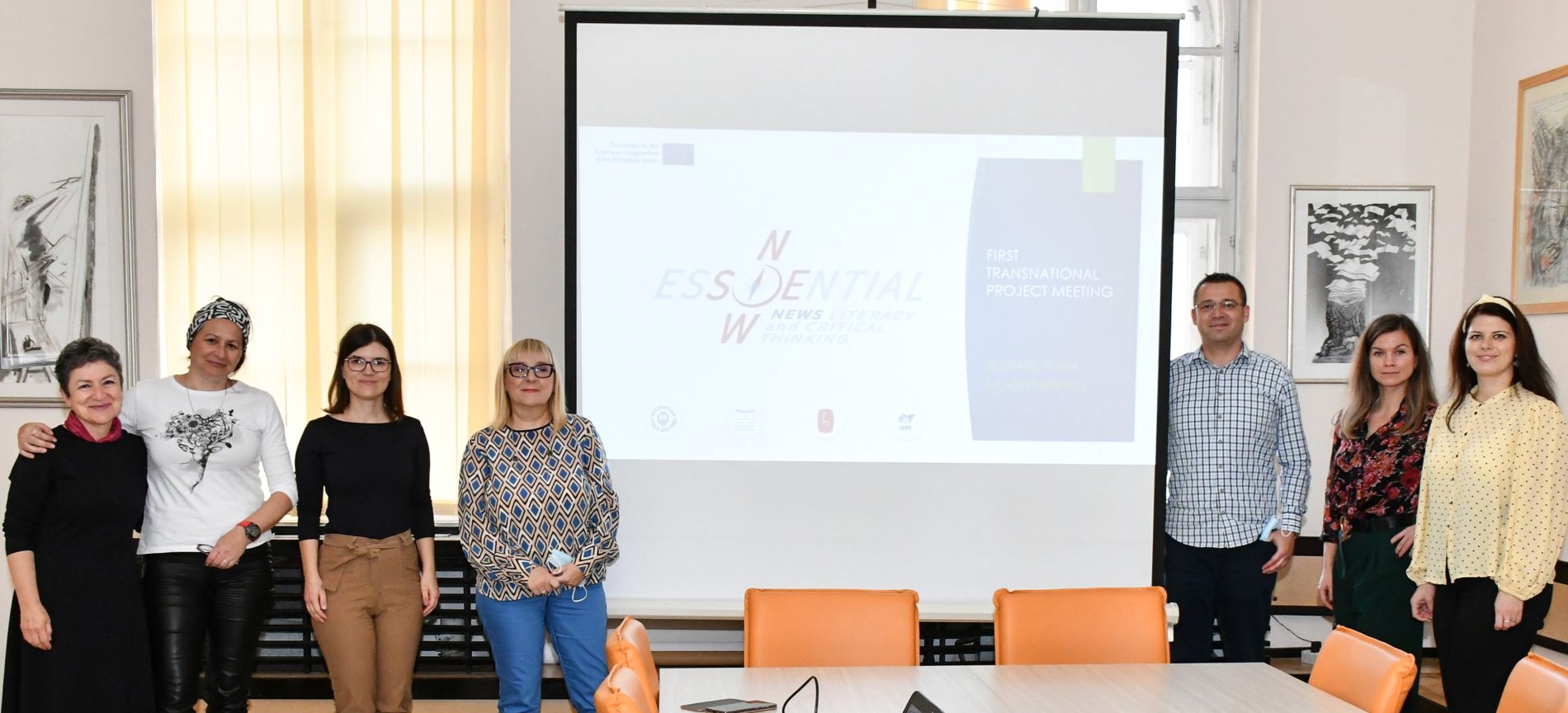
Eight people attended the meeting, two representatives of partner from Latvia, one representative of partners from Turkey and Slovenia and four representatives of the project coordinators from Serbia.
- BCL (Serbia): Jasmina Ninkov, Marjan Marinković, Milijana Jokić, Stanka Jovičić
- HU (Turkey): Serap Kurbanoglu
- NLL (Latvia): Guna Ulmane, Juta Žvira-Kundrāta
- UPI (Slovenia): Tina Baloh
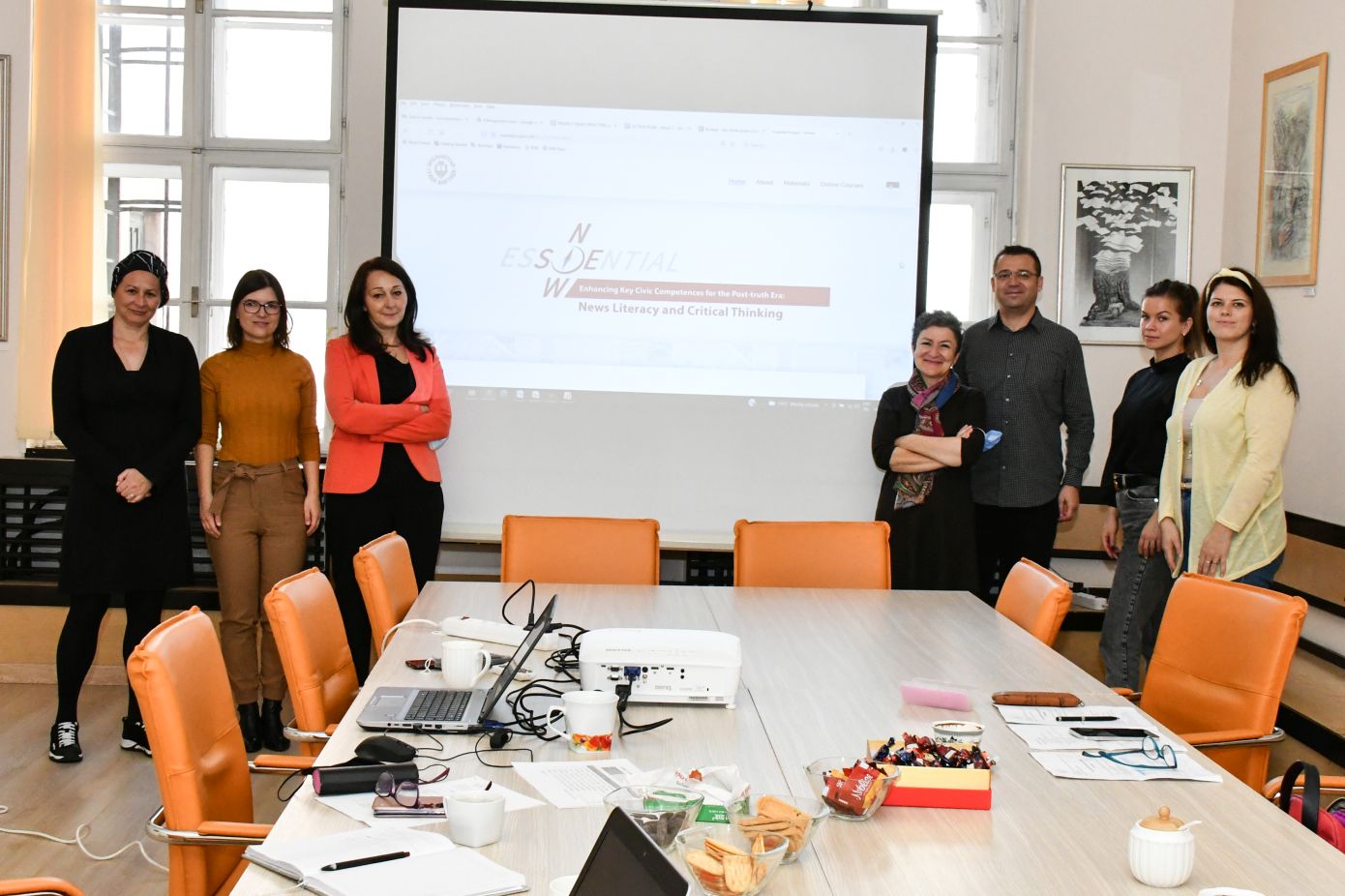
This was the first face-to-face meeting where the project partners came together. At the
meeting, the partners discussed in detail all important aspects/topics of the project:
project management, implementation of activities, risks, challenges and possible changes,
financial management (rules, regulations and justification), reporting, monitoring, project
promotion and dissemination, further steps.
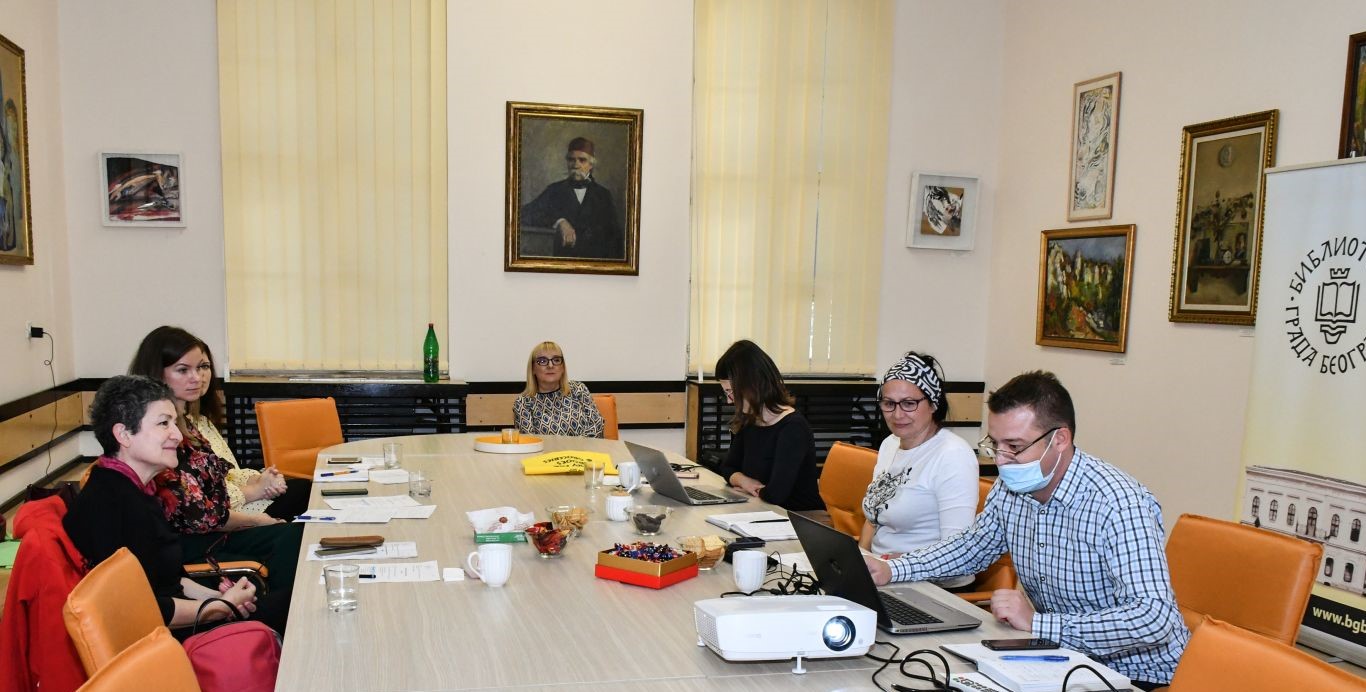
The next, second transnational meeting will be held in Ankara, in March 2022.
A STUDY DEDICATED TO NEWS LITERACY HAS BEEN CARRIED OUT

The first intellectual product has successfully been developed within the ESSENTIAL
project.
Together, the partners developed a study entitled
News literacy and critical thinking
skills in the post-truth era..
The study consists of two main chapters. The first is devoted to the sublimation of
theoretical texts and reflections on the news. It enables the reader to get better
acquainted with the phenomenon of news, fake news, misinformation, algorithms, news sources,
ways of placing and sharing news, understanding news, disinformation channels, etc. The
final part of the first chapter introduces in detail the reader to the so-called term news
literacy, which is in fact a critical understanding of the news.
The second chapter at the beginning gives brief overviews of the state of media and news
literacy in the countries from which the partners come (Latvia, Slovenia, Turkey and
Serbia). Afterwards, an analysis of an extensive questionnaire related to new literacy
conducted in these countries is presented. The results of the analysis show to what extent
this type of literacy has been developed and what are the needs of citizens regarding
education in this area.
The complete study was published on the project's website.
THE SURVEY SHOWS – THERE IS A STRONG NEED FOR NEWS LITERACY

Within the ESSSENTIAL project, an extensive online survey related to news literacy
was conducted, which included 436 respondents from Serbia, Turkey, Slovenia and Latvia.
Thematically, the survey consisted of the following units: 1) Demographics and General
Information; 2) Getting and Following News; 3) Trust and Verification; 4) News Behaviour; 5)
Opinions About the News Media.
In the text that follows, we list the main results
of the analysis of the obtained answers.
- The news plays an important part in modern society – as much as 94% of the respondents follow the news, 85% of whom do it on a daily basis (once or several times a day). Around two thirds of all the respondents think the news is necessary in a democracy. Also, the majority of the respondents think that following the news is a civic responsibility. Around two thirds of all the respondents strongly or somewhat agree with the statement that news media have the power to shape public opinion. All this supports the importance and necessity of the news in the lives of modern people as well as the strong impact it has on them. Still, the abundance of information has a negative impact on the population – a significant percentage of respondents in all four countries think that the sheer amount of news on any given day is overwhelming.
- Online channels/sources are by far the most dominant sources of information. Once dominant television now takes the third place, while printed newspapers, which used to play a very important role in providing information, are now among the least used main sources
- With regard to the type (topic) of news, the largest number of respondents follow politics – as much as 73% of them. Arts and culture are followed by 64%, and health and medicine by 62% of the respondents.
- Most respondents are suspicious about the accuracy of the news and the impartiality of news media. One of the most important reasons why the respondents do not want to follow the news is suspecting its accuracy. The results show that most respondents suspect the accuracy of the news regardless of its source. A large percentage of respondents in Turkey and Serbia strongly and somewhat disagree that news media are impartial/objective (81% and 67% respectively), while in Slovenia and Latvia there is a lower percentage of respondents who think so (38% and 23% respectively). Still, besides all this, the highest percentage of respondents are still not used to approaching the news critically. A very small percentage of respondents always verify the news, from 6% in Serbia to 3% in Turkey. (To be honest, the percentage of those who never verify the news is also very low). The largest number of respondents verify the news sometimes. On average, one in three respondents verifies the news often. Also, around half of the respondents check the accuracy of the news they share with others, while the other half of them do not do that. Only 23% of all the respondents read the whole piece of news, from the beginning to the end, before they share it with others. Only one in five respondents checks how current the information is before they share it via social networks.
- Fake news is a negative phenomenon with a strong impact. A large number of respondents in Turkey and a significant number of them in Slovenia and Serbia have lost trust in news credibility in general. A vast majority of respondents in all four countries think that the proliferation of fake news is worrying.
- Around half of the respondents in all the countries strongly or somewhat agree that they can distinguish fake news from real news. On average, 30%-40% of the respondents do not use factual evidence to confirm the news accuracy.
- The largest number of respondents (76%) verify suspicious news by checking the same news on other platforms. The very least number of respondents, 11% of them, use fact-checking platforms to verify the accuracy of suspicious news.
- With regard to the countries, between 60% and 70% of the respondents agree that knowing the exact news source is important for trusting its accuracy. This indirectly tells us that a significant nuber of respondents trust certain news sources.
- There is a higher percentage of respondents who use closed messaging apps to share news than the ones who use the social media for the same purpose. 25-30% of the respondents from all four countries share news via social media, while in Latvia, Serbia and Slovenia around one in three respondents posts/shares interesting news on closed messaging apps, and in Turkey it is done by as many as half of the respondents.
- By far the largest number of all the respondents discuss news stories with their friends, family and colleagues, which is done by 95% of the respondents on average. It is followed by those who share news stories via closed messaging apps, which is done by half of all the respondents and, the ones who rate, like and favor news stories (done by 42%). Fewest respondents write a blog on a piece of news (3%) and a comment on a news story on a news website (9%).
- The respondents’ familiarity with news terms and concepts varies. Almost all the respondents have heard of fake news (99%), 87% of them know what fact-checking is, while less than half the respondents are familiar with the term black propaganda (47%), and only one in three of them knows what gray propaganda is.
- There is a strong need for the education of citizens in the field of information, media and news, especially in the area of news literacy. Only one in three citizens had a training in information literacy, one in four citizens had a training in media literacy, and one in nine citizens had a training in news literacy. A relatively small number of respondents started to learn about news verification methods and tools in the course of last year, on average 29% of them. The situation is similar with referring to fact-checking platforms, on average 24% of respondents do that. Overall, as much as 81% of the respondents want some kind of training in the field of news literacy. The respondents show most interest in training in news verification methods (40%), developing critical thinking skills (38%) and image verification methods (37%).
A STUDY DEDICATED TO NEWS LITERACY HAS BEEN CARRIED OUT

The first intellectual product has successfully been developed within the ESSENTIAL
project.
Together, the partners developed a study entitled
News literacy and critical thinking
skills in the post-truth era..
The study consists of two main chapters. The first is devoted to the sublimation of
theoretical texts and reflections on the news. It enables the reader to get better
acquainted with the phenomenon of news, fake news, misinformation, algorithms, news sources,
ways of placing and sharing news, understanding news, disinformation channels, etc. The
final part of the first chapter introduces in detail the reader to the so-called term news
literacy, which is in fact a critical understanding of the news.
The second chapter at the beginning gives brief overviews of the state of media and news
literacy in the countries from which the partners come (Latvia, Slovenia, Turkey and
Serbia). Afterwards, an analysis of an extensive questionnaire related to new literacy
conducted in these countries is presented. The results of the analysis show to what extent
this type of literacy has been developed and what are the needs of citizens regarding
education in this area.
The complete study was published on the project's website.
THE IMPLEMENTATION OF THE PROJECT DEDICATED TO NEWS LITERACY HAS STARTED
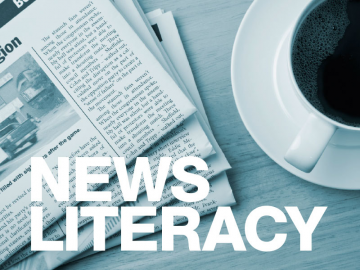
The overall objective of the project Enhancing Key Civic Competences for the Post-truth
Era: News Literacy and Critical Thinking (ESSENTIAL) is to contribute to the
development of self-aware citizens who think critically and have developed news literary
skills which is a
precondition to relevantly and efficiently participate in social and democratic processes of
their communities and at European level.
The project will create two publicly available online courses in the field of news literacy.
First course will help citizens develop critical thinking and become able to properly
understand media news, and the second is intended for experts who want to be involved in
citizens' education in this field more seriously. In addition, during the project, employees
from partner institutions will undergo training, acquire the necessary knowledge and start
educating citizens in this area.
The project develops awareness of the importance of critical thinking and understanding of
media content, for the citizen as an individual and the development of a democratic society
in general.
The project partners are Belgrade City Library, Serbia (coordinator), National Library of
Latvia, Hacettepe University (Turkey), and Adult Education Center UPI Žalec (Slovenia). The
associate partner is Teyit.org, a fake news
recognition
platform.
The project lasts from October 2020 until the end of October 2022. It is implemented within
the EU Erasmus+
Programme, Key Action 2: Strategic partnerships for adult education.
